
SIXTH FORM COURSE GUIDE
Contents Welcome from the Head of Sixth Form 1 The Sixth Form Curriculum 2 Personal, Social, Health and Economic Education 3 Electives Programme 4 Extended Project Qualification 5 Wider Life in Sixth Form 6 Careers Programme 7 Volunteering 8 Charities Committee 8 Peer Mentoring 8 Music 8 Clubs and Activities 8 Combined Cadet Force (CCF) 9 The Duke of Edinburgh 9 Theatre Production Company 9 A Level and BTEC Subjects 10 Art and Design 11 Biology 12 Business Economics 13 Chemistry 14 Classical Civilisation 15 Computer Science 16 Design and Technology 17 Drama and Theatre 18 Economics 19 English Literature 20 French 21 Geography 22 German 23 History 24 Latin 25 Mathematics 26 Music 27 Physical Education 28 Physics 30 Politics 31 Psychology 32 Religious Studies 33 Sociology 34 Spanish 35
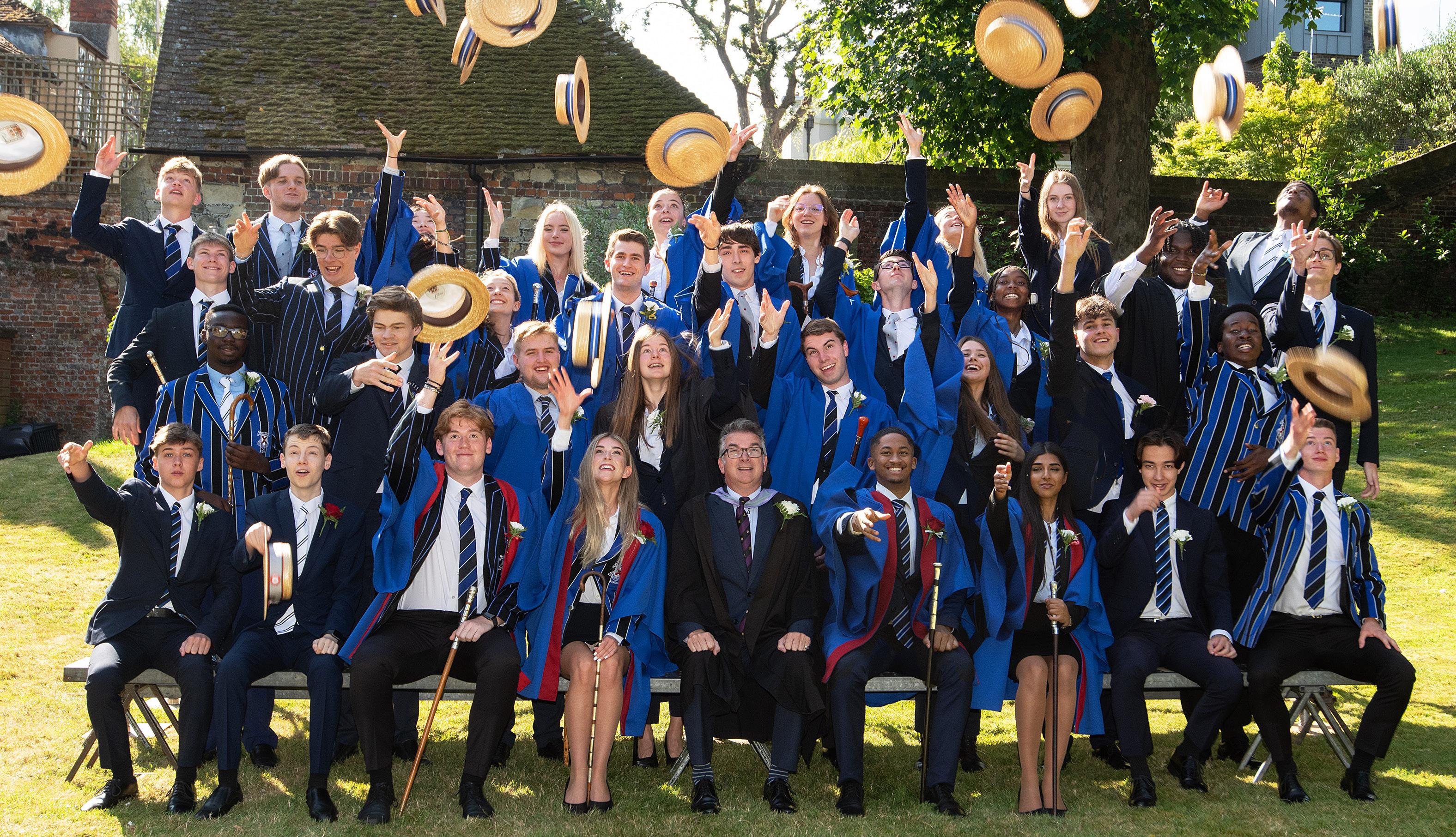
Welcome from THE HEAD OF SIXTH FORM
You are about to embark on the most exciting and challenging period in your academic career so far. A time when you can really focus on the subjects of your choice, pursuing your interests and creating the building blocks for your future university study or career choice.
This prospectus contains information about both the courses available to study and the wider Sixth Form experience at King’s. Sixth Form study is characterised by small groups, a more discursive approach and a more mature relationship with your teachers. You will have increased levels of independence and be responsible for managing your own workloads both within and outside of school, ensuring you develop essential time management and organisational skills for your future life. These changes are visibly characterised by the transition to wearing a business suit rather than a school uniform, of being able to use the Sixth Form Centre for independent study and accessing the High Street during your lunch hour.
We encourage you to focus on three or four subjects, working closely with your teachers to ensure you gain both the knowledge and the academic skills needed. Plus, you have the option of the Extended Project Qualification (EPQ) which greatly improves your opportunities with the best universities.
Your academic progress will be supported by the King’s Elective Programme for our Sixth Form which allows pupils to study a range of short or long courses which complement their academic study. There is also a strategic focus on UCAS, apprenticeships and career planning in the Upper Sixth.
Make the most of these opportunities, whilst continuing to involve yourself in team sports, drama and music, and enjoy the breadth of experiences that the Sixth Form at King’s has to offer. We are confident that you will be equipped with all the skills you need to have an extraordinary and fulfilling career. Sixth Form is a time of both academic and personal development, both of which are fully supported here at King’s.
Sarah Miles Head of KSR Sixth Form
1
THE SIXTH FORM Curriculum
Together with most HMC schools, King’s Rochester expects the majority of Sixth Form pupils to study three subjects at A Level or BTEC.
With the changes being made to A Levels by the Government, all A Level subjects are now linear. A linear subject means that all of the examinations needed to obtain an A Level in that subject will be taken at the end of two years.
At King’s we also offer BTEC national qualifications in sport. The Extended Certificate is the equivalent to 1 A Level, and the National Level 3 Sports Diploma is equivalent to 2 A Levels.
In addition to A Levels and BTECs, some pupils also take the Extended Project Qualification (EPQ). This enables them to extend their academic interests and to develop some of the skills useful for university. This qualification, worth half an A Level, is highly regarded by universities. Final selection of those who will take the EPQ is not made until after GCSE results but it is useful for pupils to indicate now if it is something in which they would be interested.
Pupils choose three or four of the subjects available for study in the Lower Sixth and all pupils take part in a games programme in which they can choose from a variety of sports. The School’s Personal, Social, Health and Economic Education (PSHEE) programme provides further depth and breadth to the curriculum.
Pupils are encouraged to use their Private Study periods in the Sixth Form Centre constructively and are supervised by members of staff. Facilities in the Sixth Form Centre include a work room with networked computers, site-wide high-speed Wi-Fi, a lounge and a dedicated kitchen to make hot drinks and snacks at break and lunch time.
In Lower Sixth, our pupils cultivate broader interests and skills through a programme of electives, including subjects such as public speaking and beginner’s Mandarin (more details in the Electives section on page 4). In the Upper Sixth, there is a strategic focus on UCAS applications, apprenticeships and career planning.
Our Friday Afternoon Activities for the Lower Sixth allow pupils to take part in one of the Combined Cadet Force (CCF) sections, join our Theatre Production Company or Volunteering group to help build key life skills, including leadership qualities and teamwork.
Aptitude tests and challenge grades
Each Michaelmas term pupils in the Lower Sixth sit aptitude tests. These national tests are formulated by the Centre for Evaluation and Monitoring (CEM) at Durham University which analyses the results and, from statistical data spanning at least ten years, is able to predict, with reasonable certainty, the results pupils are likely to get at A Level. We use these predictors, our professional judgement and what we know of each pupil, to devise Challenge Grades which are aspirational but attainable with hard work.
Entry requirements to the Sixth Form
Pupils should attain a minimum of a grade 6 in the subjects they wish to study at Sixth Form. For some subjects such as Mathematics, Languages and the Sciences however, a grade 7 or above is expected. The minimum entry requirement for the Sixth Form is five GCSE passes.
Pupils already studying at King’s are expected to continue their education in the Sixth Form if they achieve the matriculation criteria above. If this is not to be the case, the usual written notice of one term will be required.
2
Personal, Social, Health and Economic Education (PSHEE)
The PSHEE teaching programme aims to broaden the thoughts and outlook of our pupils, addressing areas and issues that are not covered elsewhere on the curriculum but which form an important part of modern life.
It also allows pupils to further develop a range of skills including critical thinking, advocacy, enterprise and decision making. Building upon the programme of study from Removes to Upper Fifth, our Sixth Form pupils focus on age appropriate modules helping to support and develop them during this crucial time in their academic career, as well as further developing them as world citizens. The Sixth Form Programme starts with a Mindset Module, to help our pupils in the transition from GCSE to A Level, getting them thinking about their medium to long term goals and what they need to do to achieve these goals. This programme focuses looking at a range of skills and attitudes which together give pupils the foundations for success.
Within Personal Wellbeing, we consider their new role in the school and how they can develop their experiences.
In Careers we consider our pupils’ next steps and consider both university and alternative routes. Citizenship Education continues to look at how we can make positive contributions to society as well as looking at new responsibilities that come with age, including driving. In Health Education we consider stress, particularly preparing pupils for the additional pressures of A Levels.
PSHEE equips pupils with the knowledge and skills necessary for effective and democratic participation. It helps pupils to become informed, critical, active citizens who have the confidence and conviction to work collaboratively, take action and try to make a positive difference to their communities and the wider world.
These courses are taught within mixed groups, giving the opportunity to meet different pupils and to really hear a mix of viewpoints and ideas.
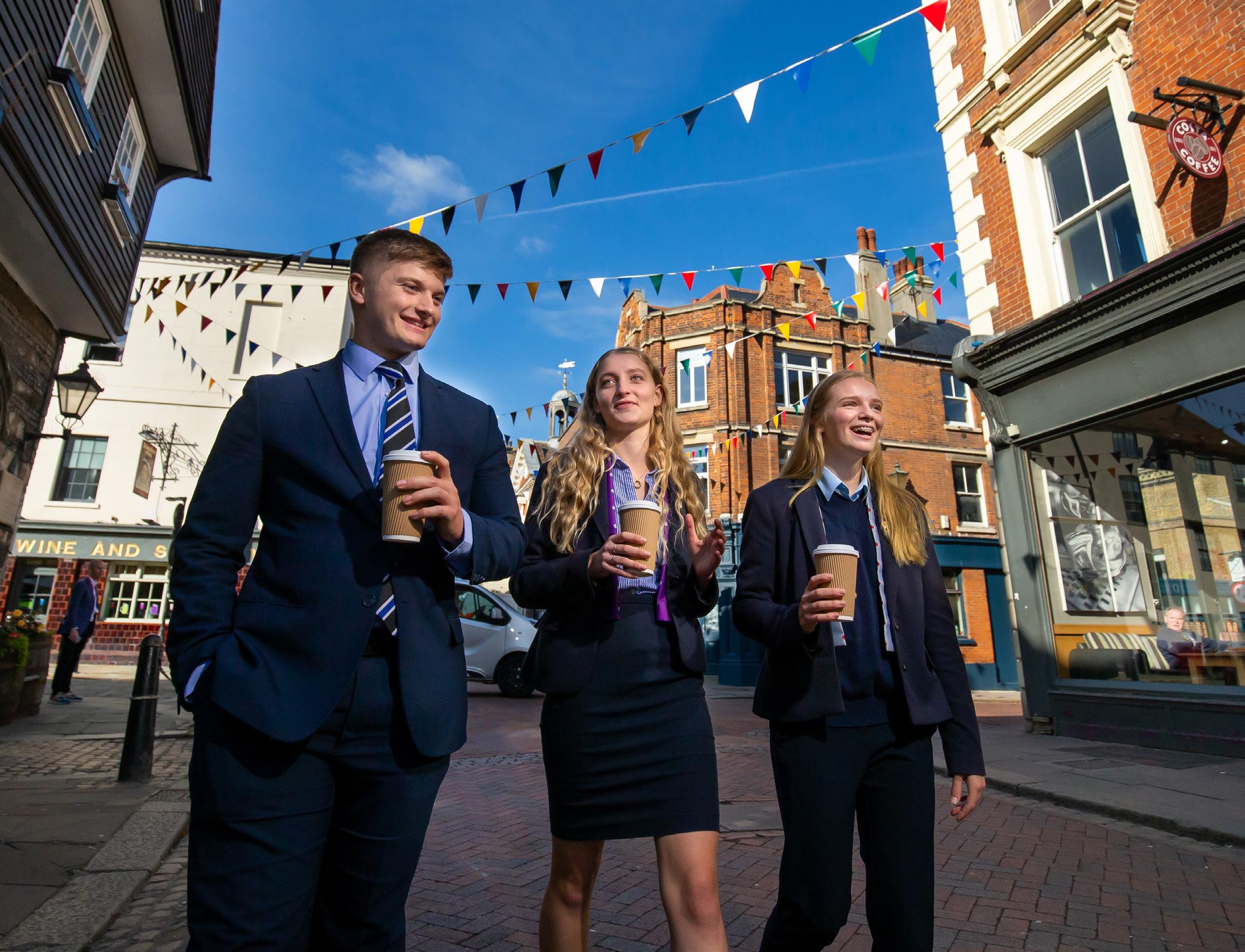
3
Electives Programme
The Electives programme is an innovative and exciting feature of the Sixth Form provision. The electives sit alongside the established Extended Project Qualification (EPQ) and are variously designed to:
• Support learning,
• Secure UCAS tariff points,
• Develop new skills and competencies,
• Extend pupils’ thinking.
Two 60-minute periods a week are dedicated to the programme and pupils will be expected to complete TWO from the following:
• A long-course (24-week) elective;
• A series of short-course (eight-week) electives;
• Extended Project Qualification.
Long-Course Electives (24 lessons):
Currently pupils may choose from courses designed to support A Level scientists and psychologists, focussing on the mathematical skills and statistical skills required in these disciplines, or they may undertake a LAMDA Public Speaking course.
Participants in the LAMDA course learn how to structure speeches and how to speak clearly, project their voice and engage an audience. Grades 6, 7 and 8 earn UCAS tariff points.
Short-Course Electives (8 lessons):
The Banned Book
This course looks at the concept of censorship, examining the ethics around literature and authority. We will explore why books have been seized from shelves and removed from public libraries and whether this is ever justifiable. Among the texts we will consider are Ray Bradbury’s “Fahrenheit 451” (1954), Maya Angelou’s “I Know Why the Caged Bird Sings” (1969) and Bret Easton Ellis’s “American Psycho” (1991).
Pupils will be exposed to the provocative and controversial, discussing issues surrounding homosexuality, race, antisemitism and feminism.
Beginners’ Mandarin
Consideration is given to the language and culture of the world’s most populous country.
Sustainability: Five Ways to Save the Planet
This course will develop pupils’ understanding of the issues surrounding Earth’s planetary health and the need for us to build a sustainable future. Pupils will work in groups to explore five major challenges facing our planet right now, establishing the problem, exploring current research ideas and developing innovative solutions to each of the issues.
The evolution of Popular Music
This elective looks at iconic songs, developing critical listening skills, considering contemporary trends and the relationship of these songs with society, examining issues such as gender and race.
4
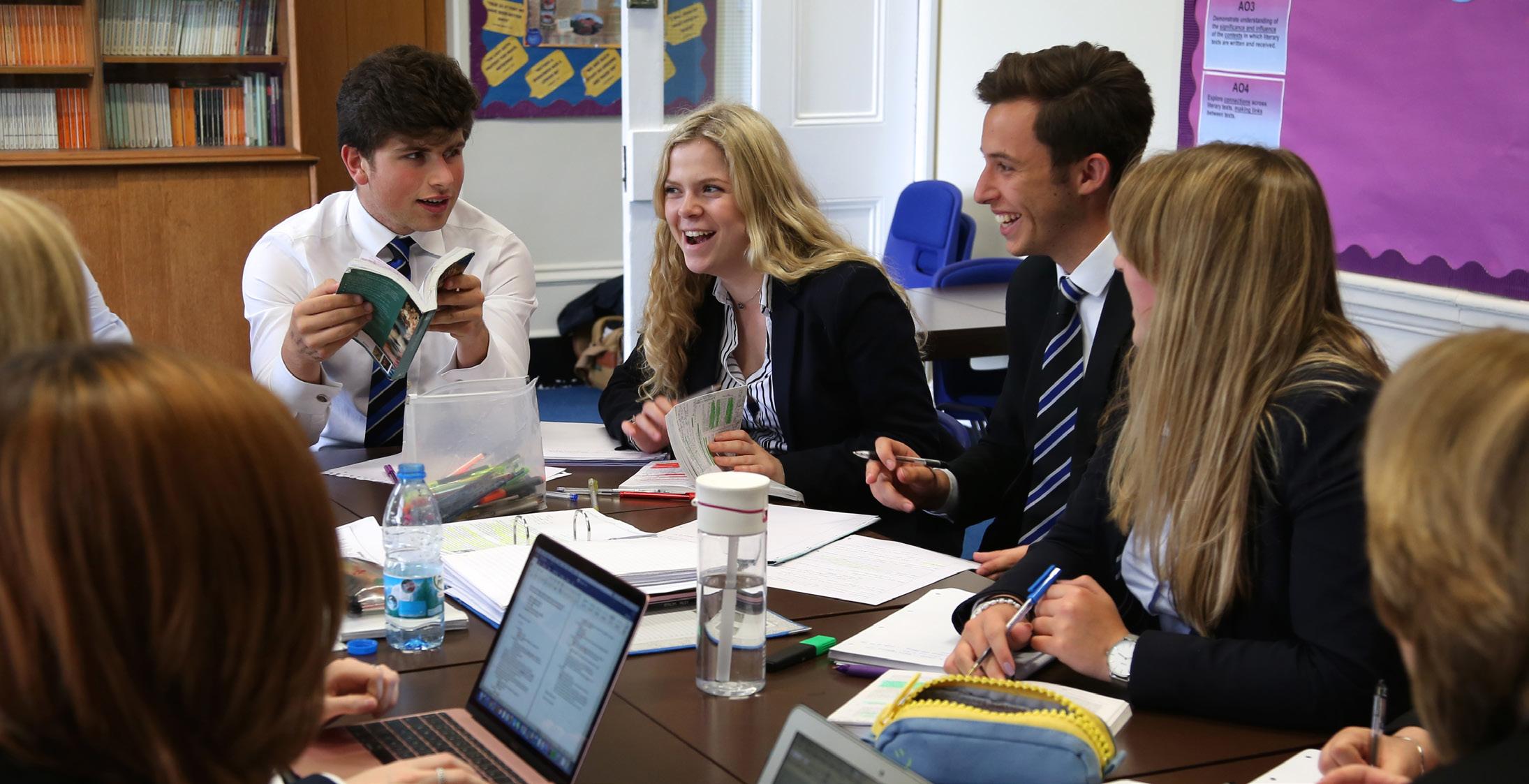
Extended Project Qualification
Imagine you could spend time at school studying something that you alone are interested in and which would give you a great advantage in university preparation. You have just imagined the Extended Project Qualification. The project can take the form of an extended essay, artefact or a science project – the choice is yours. You will learn advanced research and study skills, have an individual Supervisor to guide and support you, and you will make a special presentation to an invited audience.
What do you have to do?
• Choose an area of interest
Draft a title and aims of the project for formal approval
• Plan, research and carry out the project
• Deliver a presentation to a specified audience
• Provide evidence of all stages of project development and production for assessment
You will develop the research and study skills expected at undergraduate level. This is achieved through a programme of study taught by a team of teachers and lesson time will be allocated in the timetable. Once you have chosen your project you will then work with a Supervisor and Subject Mentor who will oversee your project. You will have to make time to do it properly, but it has many benefits.
Why complete an EPQ?
You will gain breadth and depth in a self-motivated study, which is good for you and will greatly improve your opportunities with better universities. Secondly you will study independently, a key requirement for university life. It shows you are organised and motivated and that you have not just memorised your teacher’s notes. In addition, you will be able to match candidates with the International Baccalaureate and the tens of thousands of others who have shown themselves capable of this breadth and depth of study.
What is it worth?
The EPQ is worth half the points of an A Level and it is possible to achieve an A*. It is, in effect, your fourth subject, spread over four terms.
Mrs N Gould EPQ Co-ordinator
5
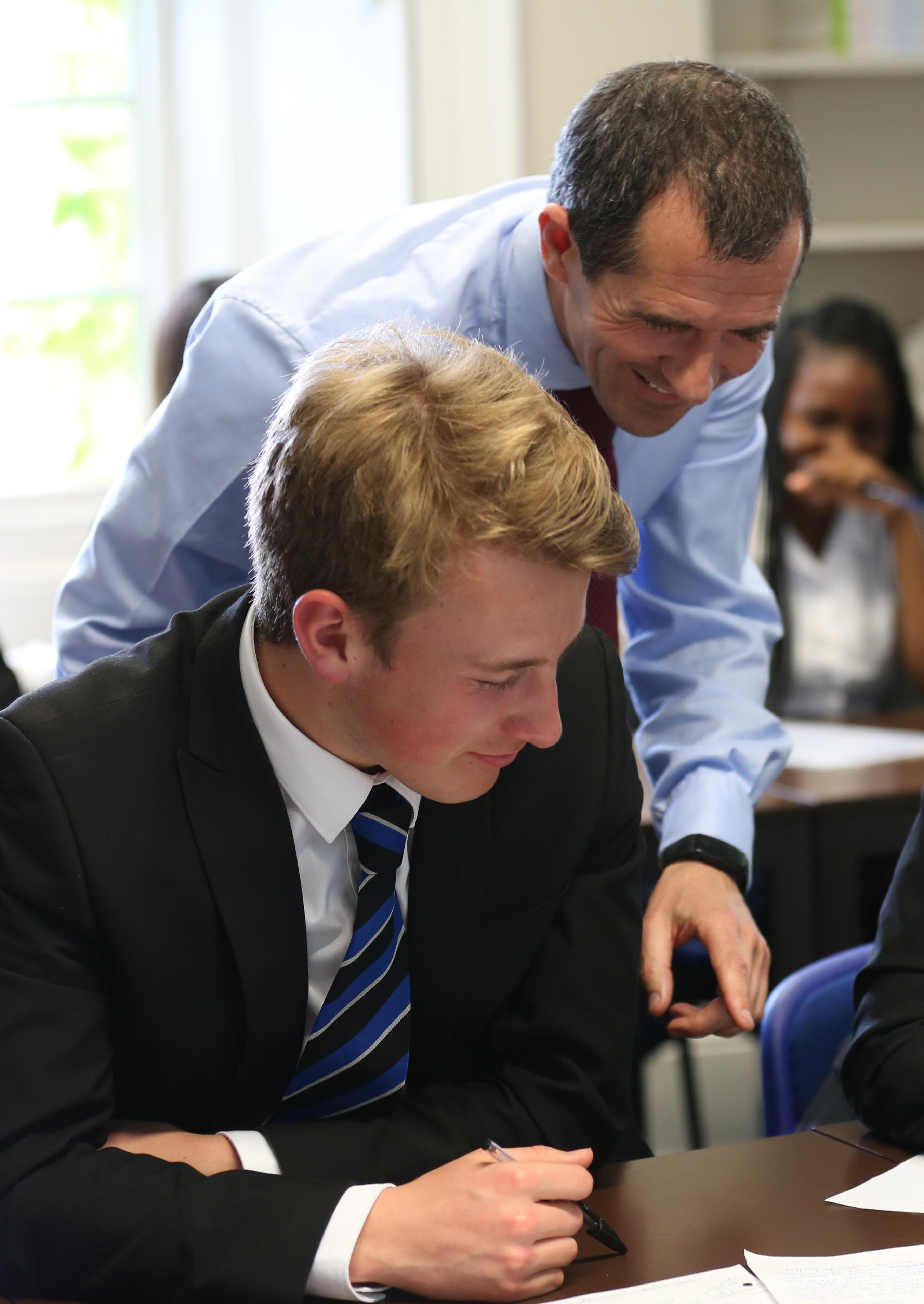
Wider Life in SIXTH FORM
Careers Programme
Building on from the careers sessions that they had during their GCSE years, a variety of career-based sessions are timetabled for the Lower Sixth and the Upper Sixth, along with a strong focus on UCAS applications, possible university options and/or potential jobs.
We are particularly proud of our highly-professional careers programme and our individualised UCAS preparation has a proven track-record in getting leavers into the top universities and on to the best courses for their future careers. After GCSE, pupils are encouraged to think in greater detail about plans for the future: namely, what would they do after A Levels or university. The majority of King’s pupils go on from school to degree courses: indeed, in recent years we are proud to be able to say that every leaver who was seeking a place in higher education achieved one. For this reason, and to ensure that pupils choose a course that is suitable for them and that they will enjoy, the main focus of advice given to Sixth Formers in the Careers Department relates to making appropriate choices in terms of applications to colleges and universities.
Obviously, for a number of pupils, potential degree subjects will relate directly to a career which the individual is seeking to enter. This is clearly true for candidates applying to read Medicine, Law, and so on, and also very specific vocational degree courses such as Aviation, Electronic Engineering and Nursing. Other leavers opt for courses of a more general nature – such as English or History, etc - which allow career options to remain more open until the pupil is at university. Each Sixth Former has the opportunity to be counselled individually about making the appropriate decisions and is encouraged to make use of the wide range of material available from the computer databases, especially the UCAS website, which is constantly being upgraded and uploaded with information about higher education.
The broader careers focus includes CV and covering letter writing seminars and career lunches with a professional from an area related to those the pupil is interested in, where the pupils can talk more informally about a variety of professions and start building contacts, are now obligatory for every Sixth Former. In addition, we hold a mock ‘assessment centre’ day which mimics those for graduate recruitment schemes, where pupils apply and go through a rigorous interview process for a fictional role. The interviewers are all external business professionals and provide feedback on their performance.
With the recent rise in university fees and the long term trend in the UK for a large percentage of young people to go to university, we are also trying to encourage our pupils to look at other options besides university. The School maintains contacts with many local businesses, firms based in London and with MEBP (Medway Education Business Partnership) who provide an extensive and varied selection of work placements for pupils who wish to gain work experience. As the global market and career patterns change, we try and encourage our pupils to be realistic about their futures and make informed decisions about the various options open to them.
As graduates find it increasingly difficult to get work in their specialist fields, pupils must realise that university is not the only option that they could take and, in a lot of cases, it could be best to enter directly into the job market. Our aim in the Careers Department is to offer the pupils optimum individual guidance, focus and preparation as they make the very important decisions for life after school.

7

Charities Committee
Volunteering
Pupils in the Lower Sixth (Y12) may choose to volunteer both in School and in the local community.
Pupils undertake one internal and one external placement throughout the year, comprising a range of activities such as supporting a reading programme in a local primary school, helping older people in the community, supporting Pre-Preparatory and Preparatory School pupils, coaching swimming and rugby, or working in a local charity shop.
Volunteering is a fantastic opportunity for pupils to learn the importance of supporting others and giving back to their local community.
Each year, the Senior School chooses a charity to support throughout the entire academic year. The Charities Committee work on raising money for this charity and come up with ideas to get people as involved in events and fundraising as we can. This small group of Lower Sixth pupils are absolutely essential in the smooth running of charity fundraising, and have a wide range of responsibilities. We work on events such as quiz nights, 5-a-side football, open mic nights, proms and discos, as well as raising money within school through things like cake sales and the annual Valentine’s rose deliveries. Charities Committee is a lot of fun, but also can be a lot of hard work and requires a committed and dedicated team who don’t mind putting in the occasional evening for an event.
Peer Mentoring
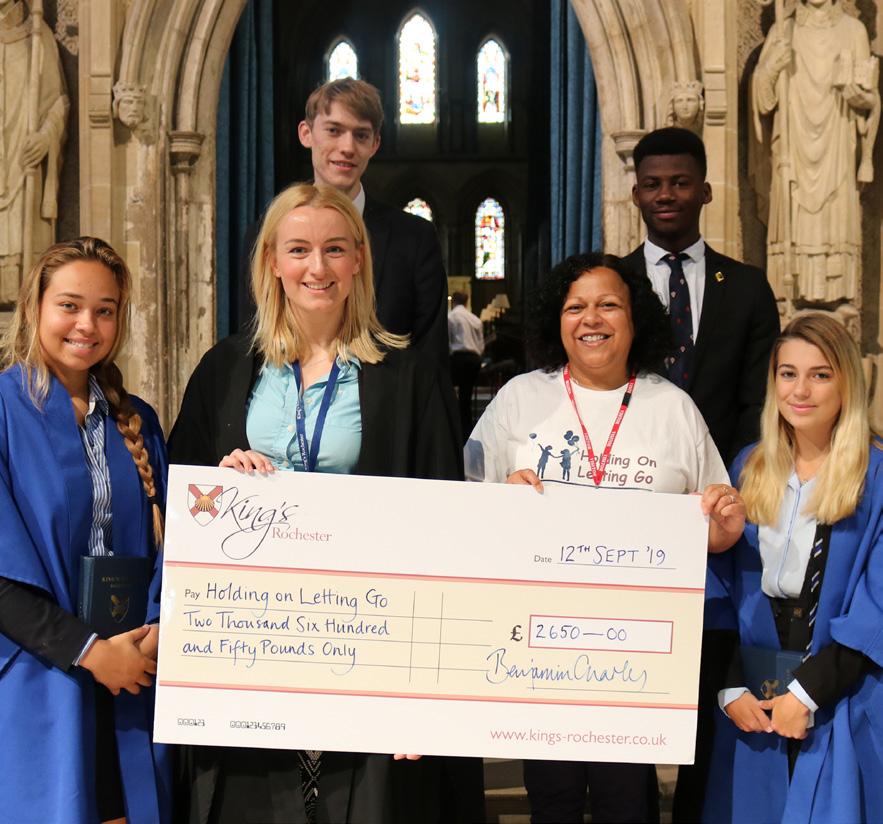
Pupils in the Lower Sixth have the opportunity to become Peer Mentors. Our Mentors work with pupils in Year 7, Year 8 and Remove supporting them through the transition from the Prep to Senior School. Peer Mentors go into tutor time where they undertake a range of activities including running short lessons, supporting pupils with prep, answering questions and generally being a friendly ear. This is a fantastic opportunity to gain new skills including listening, leadership, time management and organisation.
Music
The breadth of musical opportunity is huge, with a diverse range of ensembles and events in which to perform. Pupils enjoy creative freedom and flexibility within their subject, and are encouraged to follow individual musical paths. Our team of 22 instrumental teachers teach lessons on almost all instruments. In addition to our strong classical music tradition, we also have a lively series of Open Mic Nights and informal concerts. The House Music competition, which takes place in the first term, involves all pupils and is one of the most enjoyable and vibrant evenings of the year. Although some pupils pursue careers in music, many pupils pursue their love of performing at different levels.
Clubs and Activities
Pupils in the Senior School can enjoy a range of clubs and activities, such as Chess, Astronomy, Debating, eSports, Knit and Natter, Medieval Society, Art and Design, Ballet, Music, Sport, Acapella, Choir and Jazz, each taking place during lunchtime, after school or over the weekend. This is further enhanced by a range of regular trips both abroad and closer to home, which help to broaden our pupils’ horizons and understanding of the world around them. Details of the current up-to-date co-curricular offerings and trips are emailed to parents on a termly basis.
8
Combined Cadet Force (CCF)
Senior pupils have the opportunity to join our School’s Combined Cadet Force (CCF), which delivers the cadet experience across all three contingents: Royal Navy, Army and Royal Airforce. The CCF is a youth organisation sponsored by the Ministry of Defence, which offers pupils the opportunity to grow their skills in leadership, discipline, motivation, self-awareness and perseverance.
The programme comprises a wide range of activities, including Adventure Training, Leadership Training and Single Service Subjects (Afloat, Flying, Field Craft and Shooting), all of which are delivered by specialist military and civilian instructors.
The Duke of Edinburgh Award
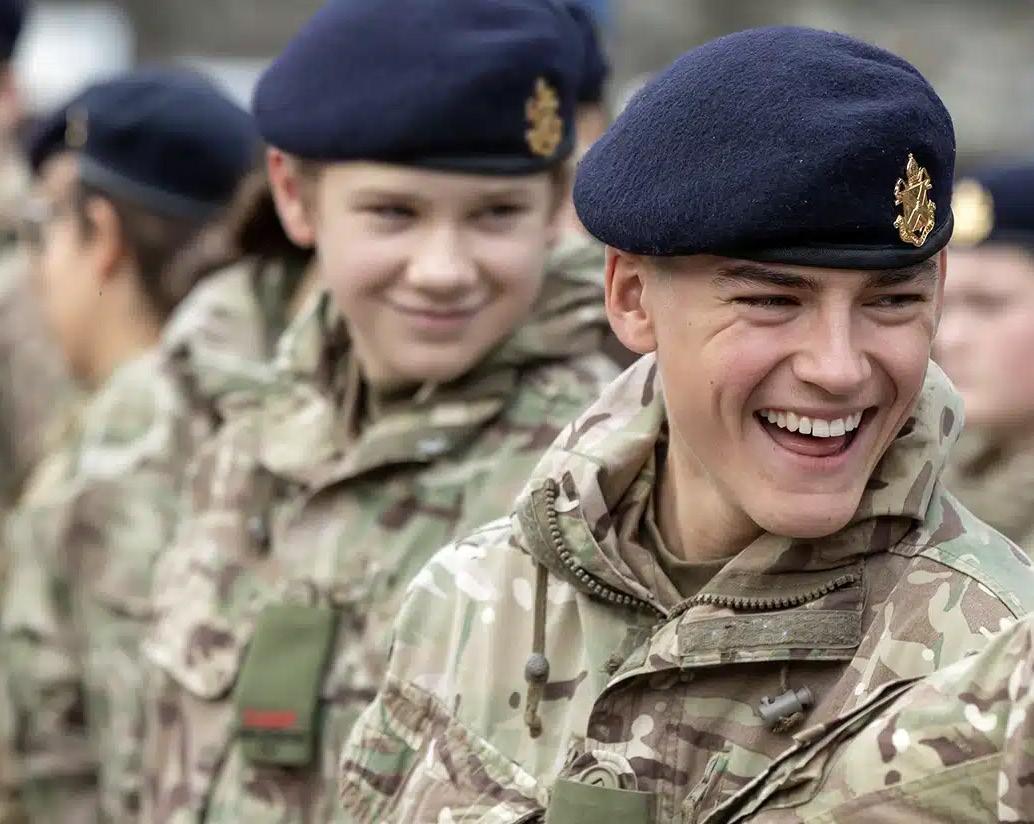
Pupils also have the opportunity to take part in all three levels of The Duke of Edinburgh Award, a fantastic programme of activities and challenges designed to develop essential skills for life and work, such as resilience, problem-solving, team-working, communication and drive.
Taking part in The Duke of Edinburgh Award is a life-changing experience, and a great opportunity to build friendships and discover new talents and interests. A recognised mark of achievement, The Duke of Edinburgh Award enhances pupils’ future CVs and university applications.
Theatre Production Company
The Theatre Production Company assists with the delivery of school productions and events, and is a valuable opportunity for pupils wishing to learn the practical disciplines needed for this area of work.
Theatre Production offers broad, practical training in all areas that contribute to making a theatre production, including lighting, sound, set painting, sourcing and making props and costumes, puppetry, hair, makeup and stage management. The programme of activities is dependent on the performances taking place across the school, creating a varied and exciting experience for our pupils.

9
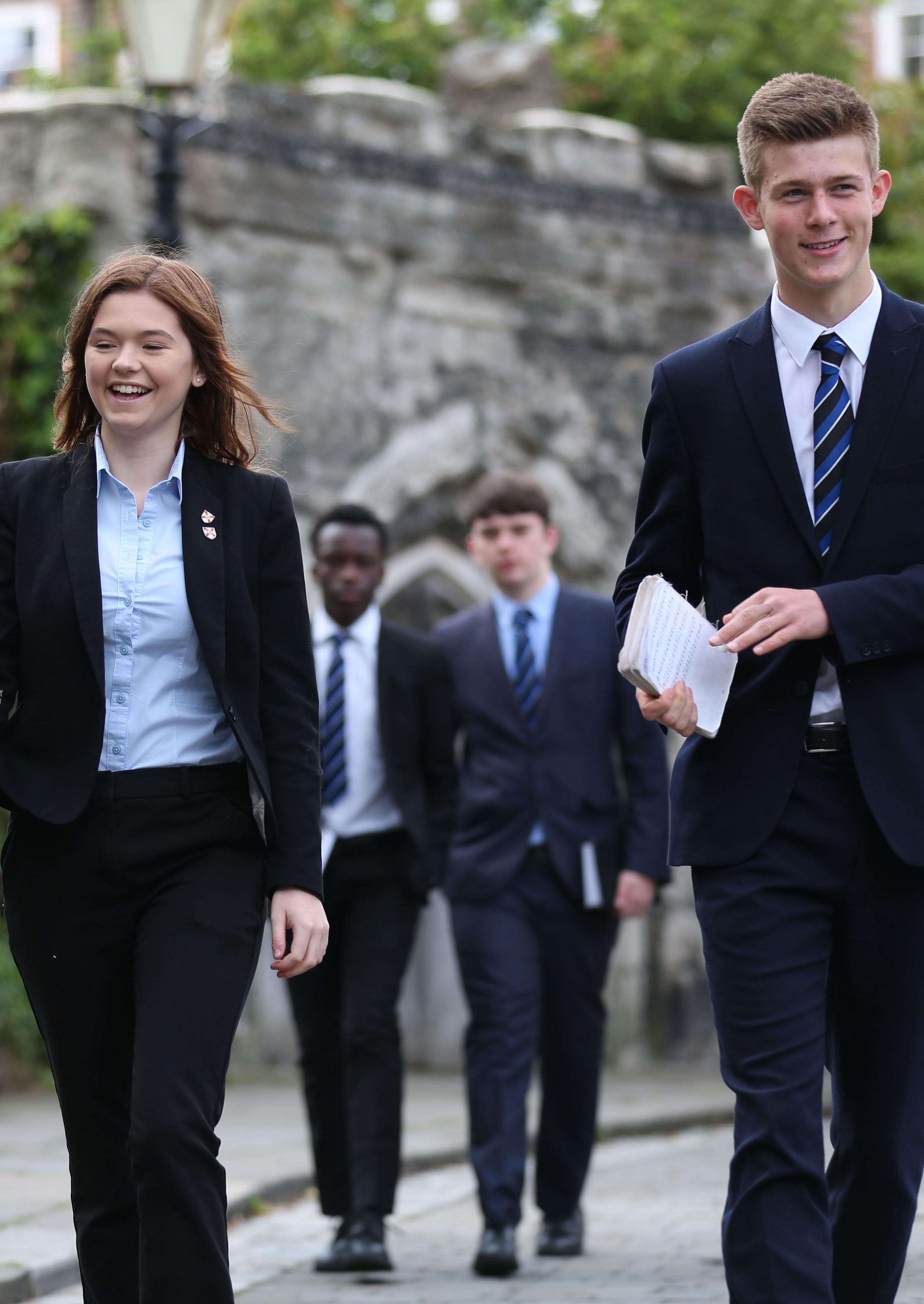
A Level & BTEC SUBJECTS
ART AND DESIGN
Examination Board: Edexcel
Mr A Robson – Head of Art and Design
Specification: 9FA0/9GC0 arobson@kings-rochester.co.uk
A Level in Art and Design consists of two components following either Fine Art or Graphic Communication. These components are teacher assessed and externally moderated by Edexcel.
For each component pupils produce a portfolio of development work and finalized outcomes in a response to a theme. Throughout pupils generate and develop ideas, research primary and contextual sources, record practical and written observations, experiment with media and processes, and refine ideas.
The components are as follows:
Component 1: Personal Investigation (coursework)
60% of the qualification
Theme: Pupils devise their own theme
Duration: Four terms
Component 1 also includes a Personal Study, which will be evidenced through critical written communication showing contextual research and understanding in a minimum 1,000 words of illustrated continuous prose. The Personal Study comprises 12% of the total qualification.
Component 2: Externally Set Assignment (examination)
40% of the qualification
Theme: Externally Set
Duration:
• Preparatory studies: throughout the Lent term
• Examination: 15 hours (over two days) taking place early in the Midsummer term
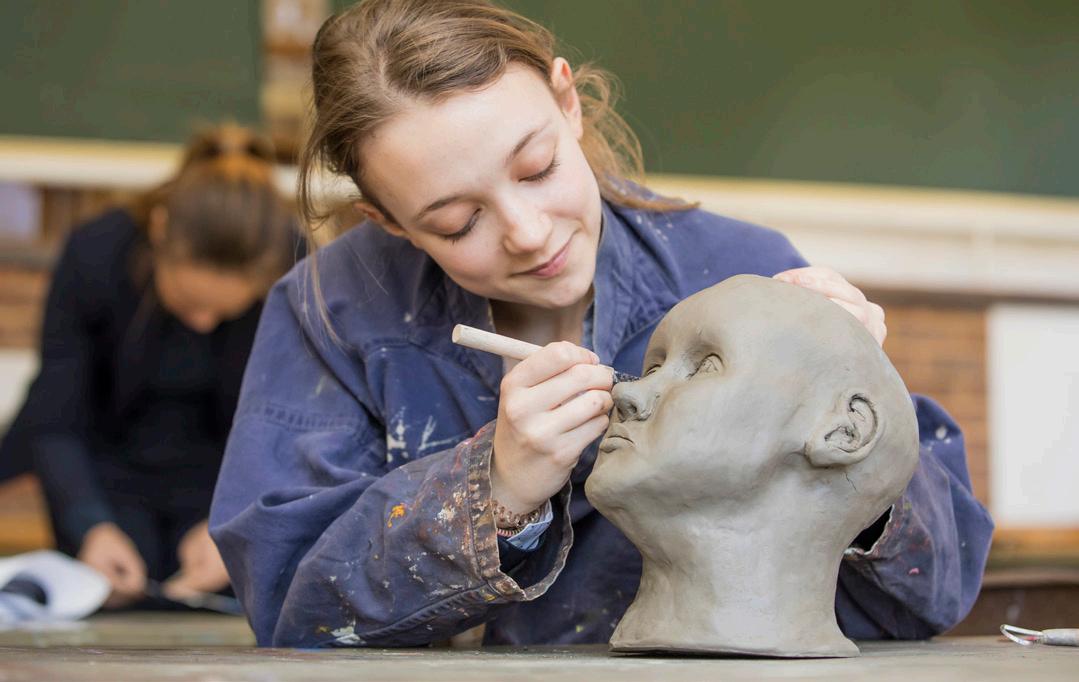
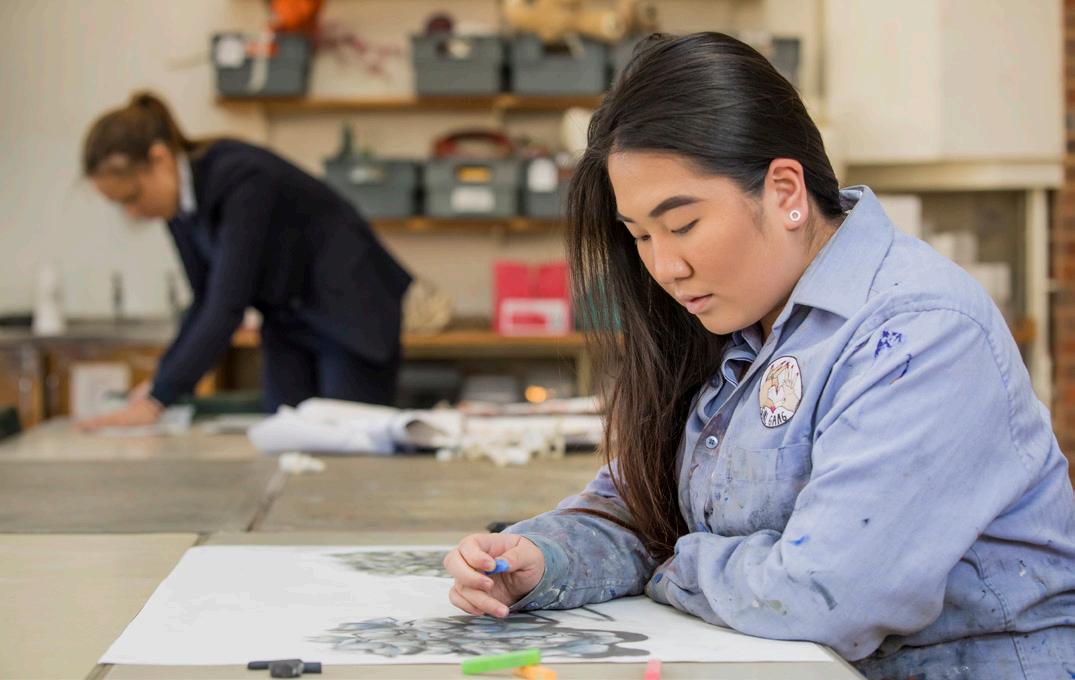

11
BIOLOGY
Examination Board: OCR Miss V Burgess – Head of Biology
Specification: Biology A vburgess@kings-rochester.co.uk
Biology A Level is split into six teaching modules. Modules 1 to 6, combined with the Practical endorsement, constitute the full A Level. The teaching modules can be summarised as:
Module 1
Development of practical skills in Biology – this module underpins the whole of the specification and covers the practical skills that pupils should develop throughout the course. The practical skills in this module can be assessed within written examinations and within the Practical endorsement.
Module 2
Foundations in Biology – covering key concepts required throughout the remaining modules.
Module 3
Exchange and transport.
Module 4
Biodiversity, evolution and disease.
Module 5
Communication, homeostasis, and energy.
Module 6
Genetics, evolution and ecosystems.
Entry Requirements
Pupils awarded triple Science require a 7 in Biology with at least a 6 in Maths. Pupils having achieved double award Science require a 7 with a 6 in Maths. This is due to the high mathematical content of the course, including statistics and quantitative analysis.
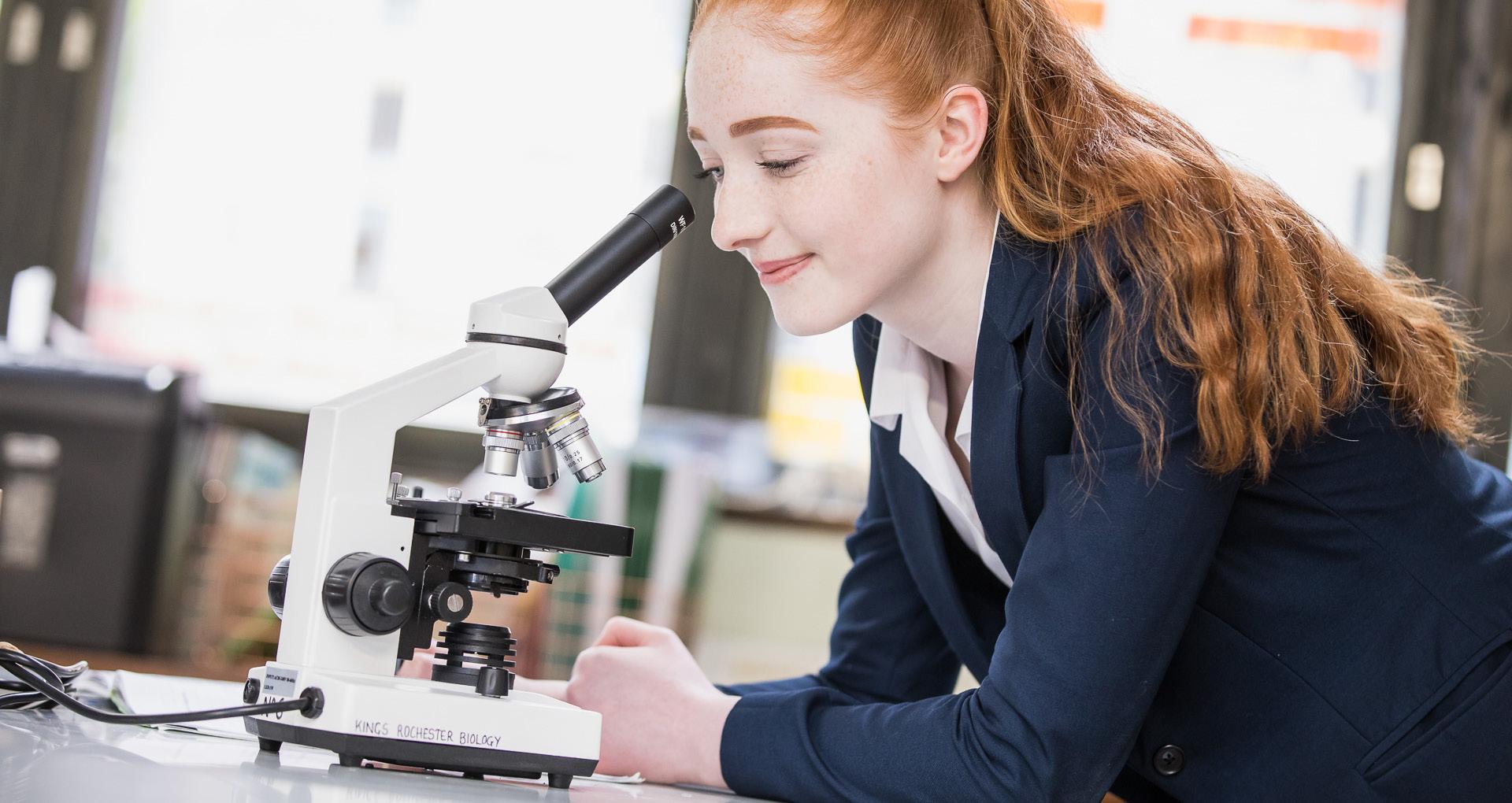
12
BUSINESS ECONOMICS
Examination Board: Edexcel Mr C White – Head of Business and Economics Specification: 9EB0 cwhite@kings-rochester.co.uk
The Business Economics A Level course is divided into four themes and consists of three externally examined papers. Pupils are introduced to Economics through building knowledge of core microeconomic and macroeconomic concepts, and by investigating economic theory through real-world businesses and the environments in which they operate.
Breadth and depth of knowledge and understanding, with applications to more complex concepts and models are developed in the second year of study.
Pupils will need to apply their knowledge and understanding to both familiar and unfamiliar contexts in the assessment and demonstrate an awareness of current economic events and policies.
Theme
1: Markets, Consumers and Firms
• Scarcity, choice and potential conflicts
• Enterprise, business and the economy
Introducing the market
• Role of credit in the economy
• Market failure and government intervention
• Revenue, costs, profits and cash
Theme
3: The Global Economy
Globalisation
• Economic factors in business expansion
• Impact of globalisation on global companies
• Impact of globalisation on local and national economies
Global labour markets
• Inequality and redistribution
Theme 2: The Wider Economic Environment
• Business growth and competitive advantage
• Firms, consumersa and elasticities of demand
Productive efficiency
• Life in a global economy
• Economic cycle
• Introduction to macroeconomic policy
Theme
4: Making Markets Work
Competition and market power
• Market power and market failure
• Market failure across the economy
• Macroeconomic policies and impact on firms and individuals
Risk and the financial sector

13
CHEMISTRY
Examination Board: OCR
Mr C M White - Head of Chemistry
Specification: H432 Chemistry A cmwhite@kings-rochester.co.uk
The A Level specification guides an enthusiastic pupil through the initial challenges of the subject by concentrating on establishing the strong foundations of theoretical and practical skills that form the backbone of Chemistry. The first year builds on knowledge acquired at GCSE and in the second year the development of a greater depth of understanding is expected. Emphasis is placed on experiments throughout the course, as all Chemical knowledge is derived from direct observation of the world around us.
Chemistry is often referred to as ‘the central science’ as it intersects with so many other fields, meaning that it can be paired with many other A Level subjects.
GCSE Requirements: Minimum grade 7 in Chemistry (or Dual Science) and grade 7 in Mathematics.
Aims of the course:
To develop pupils’ knowledge and understanding of Chemistry
• To increase their awareness of the applications of Chemistry in other contexts and in industry
• To develop pupils’ abilities to carry out practical work accurately and effectively
Skills needed to succeed:
• Pupils are introduced via experiments and the practical part of the course is assessed
• Some theoretical concepts are quite abstract and require a willingness to think of them in terms of models which we can visualise and understand
• Although the level of mathematical skills required is not especially high, pupils who struggle with mathematics will find physical Chemistry very challenging.
Module 1
Development of Practical Skills
Module 2
Foundations in Chemistry
Module 3
Periodic Table and Energy
Module 4
Core Organic Chemistry
Module 5
Physical Chemistry and Transition Elements
Module 6
Organic Chemistry and Analysis
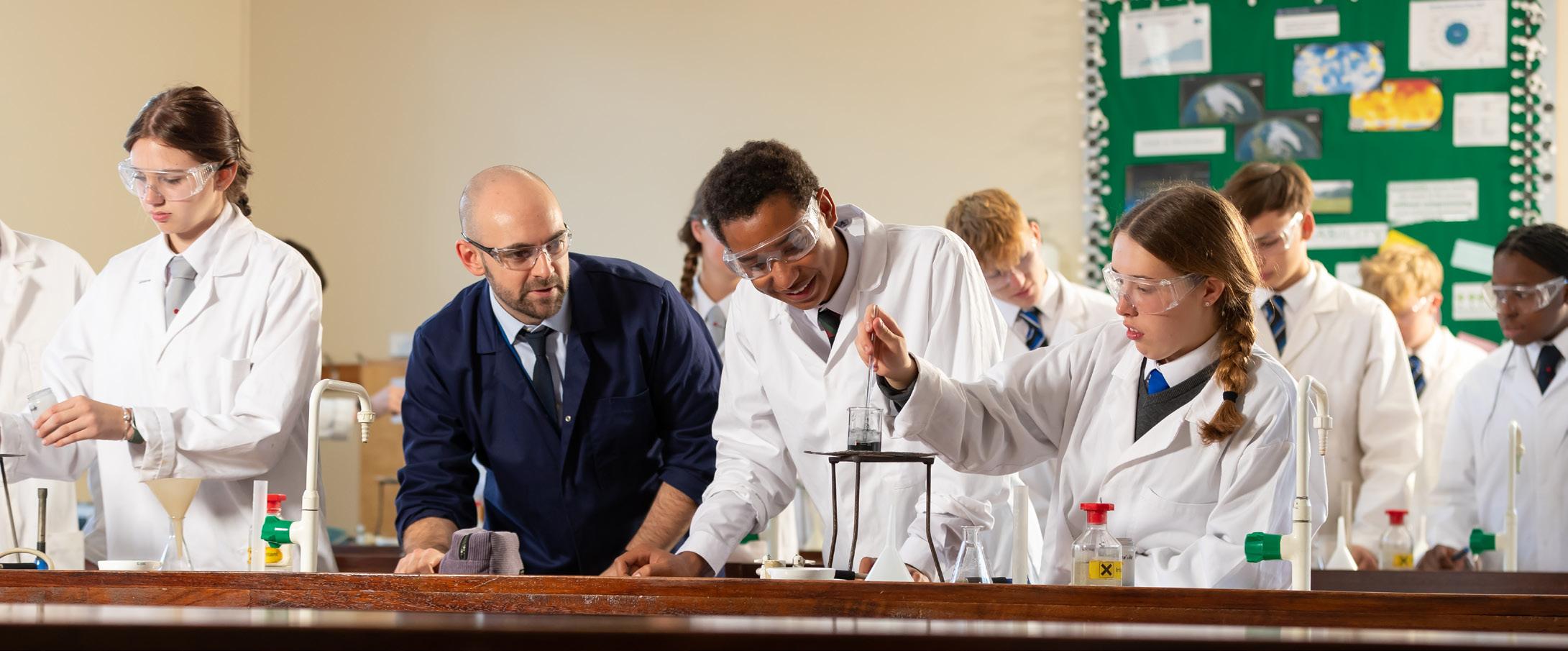
14
CLASSICAL CIVILISATION
Examination Board: OCR
Mr C Carroll – Head of Classics Specification: H408 ccarroll@kings-rochester.co.uk
A Level in Classical Civilisation has been designed to provide pupils with a broad, coherent and rewarding study of the literature and culture of the classical world. It offers pupils the opportunity to study elements of the literature, visual/material culture and thought of the classical world, and acquire an understanding of their social, historical and cultural contexts. This program is well suited to pupils who have an interest in History, Politics, Religious Studies, English, Sociology and Drama, and covers a breadth of topics which will fascinate any enquiring young mind.There is no requirement to have read Classics at GCSE to undertake the A Level program.
Lower Sixth - Component 11: The Odyssey
A study of western literature’s first works. The adventures of Odysseus are very well known: the Cyclops, Circe the Witch, Calypso. In lessons, pupils will learn about the context of the composition of the poem and consider the social and ethical themes which are apparent. There are questions which each generation asks itself: what is honourable? what is virtuous? what makes a life worth living? In reading the Odyssey pupils get to consider the answers an ancient Greek society suggested to these questions as well as considering their own answers to them.
Component 12: Greek Theatre
A study of the art form invented by the Greeks which has shaped western culture. Pupils learn about the physical aspects of Greek drama by examining material remains of theatres themselves as well as vase paintings which depict performances. Pupils read three plays: two tragedies, Bacchae and Oedipus Rex, and a comedy, Frogs. The texts are studied in translation. They consider the role of drama in Fifth Century Athens, a society which invented democracy and saw theatre as an integral part of it. The course explores a range of societal and ethical beliefs while continually learning to analyse and assess the society through literature and drama.
Upper Sixth - Component 34: Politics of the Late Republic
The Late Roman Republic was a period of upheaval and conflicting views on how the Roman state should function. These conflicts eventually led to the downfall of the Republican res publica (state) and the rise of the Roman Emperors. In this component learners will study the political thought of the period from Sulla’s retirement in 79 BC to the death of Cicero in 43 BC, through examining Marcus Porcius Cato (‘Cato the Younger’), Gaius Julius Caesar, and Marcus Tullius Cicero. The exploration of the very different ideas of three contemporary political figures brings this tumultuous period to life for learners and moves beyond simply studying ideals and abstracts, and into discussion of the practical difficulties familiar to states throughout history. By examining their distinctive attitudes, political beliefs, conduct, and impact, learners will explore the ways in which the later Republican res publica (state) developed, changed, and ultimately fell.
Component 11: The Aeneid
In addition to the Greek work of Homer’s Odyssey, pupils read the Roman epic the Aeneid. The consideration of the Roman view of heroism is contrasted with that found in the Odyssey. Pupils also consider creative imitation as they compare the Roman work with its predecessor, by which it is inspired. The Aeneid is one of the finest pieces of Roman literature and has fascinated classicists for generations, we discover the foundations of the Roman race, while evaluating the socio political context of Ancient Rome. This module encourages pupils to understand the values of literature and the ability to critically respond to questions.

15
COMPUTER SCIENCE
Examination Board: OCR
Mr C Coetzee – Head of Computer Science Specification: H446 ccoetzee@kings-rochester.co.uk
A Level Computer Science equips pupils with logical, practical, and creative skills in a vital technological field. The curriculum is divided into programmatic and theoretical elements. Programming focuses on Python, supplemented by HTML, CSS, JavaScript, and SQL. Pupils explore programming basics, data structures, algorithms, and object-oriented design.
The theory component delves into computer internals, binary data representation, computer architecture, assembly language, the fetch-execute cycle, networking, and database theory. It also examines the social and legal impacts of computing and problem decomposition.
This challenging course paves the way for university programs and apprenticeships. It fosters problem-solving and IT skills valuable in various fields like IT management, engineering, media, journalism, and medical technology.
Key Skills Developed
• Problem-Solving: Essential for recognising problems, identifying solutions, and making decisions. This skill is highly transferable across careers.
• Creativity: Pupils pursue their interests in a structured project, enhancing creativity and preparing them for future artistic or business challenges.
• Attention to Detail: Programming requires precision, teaching pupils to be meticulous and thorough.
Course Components
A Level Computer Science includes two exams (each 40% of the grade) and a project (20%). The first exam assesses problem-solving and algorithmic thinking. The second exam tests theoretical knowledge of computer systems, societal impacts, networking, and databases, including Boolean algebra and pseudocode analysis.
The non-exam assessment, or project, is a highlight for pupils. They select a project on a topic of their interest with a significant programming component, addressing real-world problems. Examples include game engines, mobile apps, and machine learning investigations. The project develops project management, planning, and testing skills.

Entry Requirements
While prior Computer Science study at GCSE isn’t mandatory, familiarity with programming is beneficial. The course’s significant programming and mathematical content can be challenging without previous experience. A GCSE Maths score of at least 6, preferably 7 or higher, is advised due to the course’s logical and mathematical demands. Those enjoying mathematics, languages, or pattern recognition may find the course particularly engaging.
16
DESIGN AND TECHNOLOGY
Examination Board: Edexcel Mr J Johnson – Head of Design and Technology Specification: 9DT0 jjohnson@kings-rochester.co.uk
Design and Technology has a major impact on every part of our lives. Our homes, transport, communication, entertainment and leisure activities are all the outcome of design and technological activity. As technological change gathers pace, it is essential that our pupils have a thorough understanding of the world in which they live.
A Level Design and Technology aims to provide an opportunity for pupils to develop their own creativity, capability and entrepreneurial skills, to apply knowledge and understanding to a range of technological activities and to develop critical thinking and collaborative skills.
The minimum requirement for A Level Design and Technology is grade 6 at GCSE.
In particular, the aims of the GCSE qualification in Design and Technology allow pupils to:
• Develop and sustain innovation, creativity and Design and Technology capability, to recognise constraints and produce high quality products
• Develop a critical understanding of the influences of the processes and products of design and technological activity
• Apply essential knowledge, understanding and skills of design production processes to a range of technological activities and develop an understanding of industrial processes
• Use ICT to enhance their design and technological capability
• Recognise the social, moral, spiritual and cultural values inherent in design and technological activity
Pupils identify a client/user group with whom they must develop the basis of a problem to solve. They should liaise with their client/user group at all stages of the designing and manufacturing process in a commercial manner. They must take responsibility for planning, organising, managing, and evaluating their own work. Staff are allowed to advise but are not allowed to take responsibility for the work. Disorganised pupils find this aspect of the course extremely difficult. The coursework project is internally marked and externally moderated.
Visits to galleries, museums and local industry form an essential part of this course. Pupils should be well motivated, have a strong interest in designing, modelling, making and evaluating products and have an interest in the processes and products of design and technological activity.
Design and Technology has proved to be a very popular and rewarding subject at A Level. Many pupils have achieved top grades and have gone on to study a wide range of related courses at university, including Product Design, Industrial Design, Engineering and Architecture. Other pupils have used their excellent results to gain maximum UCAS points and have gone on to study a contrasting subject at university. We keep in close contact with many past pupils who are willing to discuss university course details with prospective A Level candidates.
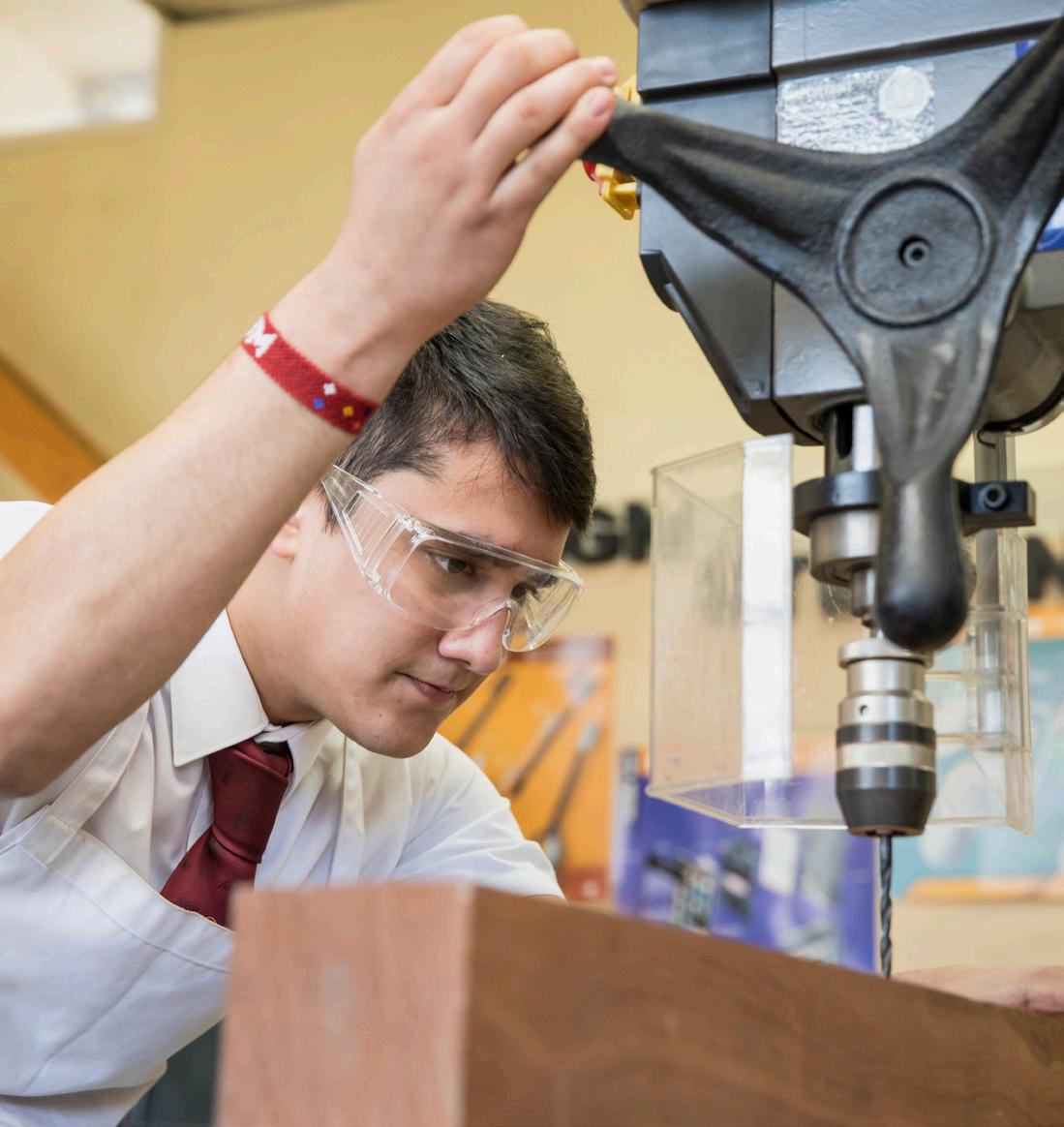
17
DRAMA AND THEATRE
Examination Board: Edexcel Miss K Hebden - Head of Drama
Specification: A Level Drama and Theatre khebden@kings-rochester.co.uk
Drama and Theatre aims to promote enjoyment and interest in drama and theatre both as a participant and as an informed member of an audience. The A Level subject extends the skills, knowledge and understanding needed to communicate through drama and theatre, and develops an understanding and appreciation of the significance of social, cultural and historical influences on the development of drama and theatre. The pupil experiences a range of opportunities to develop a variety of dramatic and theatrical skills, enabling pupils to grow creatively and imaginatively in both devised and scripted work and provides a worthwhile and complete course of study that broadens experience, develops imagination, fosters creativity and promotes personal and social development through the exploration of drama.
Summary of Assessment
Component 1: Devising
Non-examination assessment 40% of the qualification 80 marks
• Devise an original performance piece
• Use one key extract from a performance text and a theatre practitioner as stimuli Centre choice of text and practitioner
• Performer or designer routes available
Component 2: Text in Performance
Non-examination assessment 20% of the qualification 60 marks
• A group performance/design realisation of one key extract from a performance text
• A monologue or duologue performance/design realisation from one key extract from a different performance text
• Centre choice of performance texts
Component 3: Theatre Makers in Practice
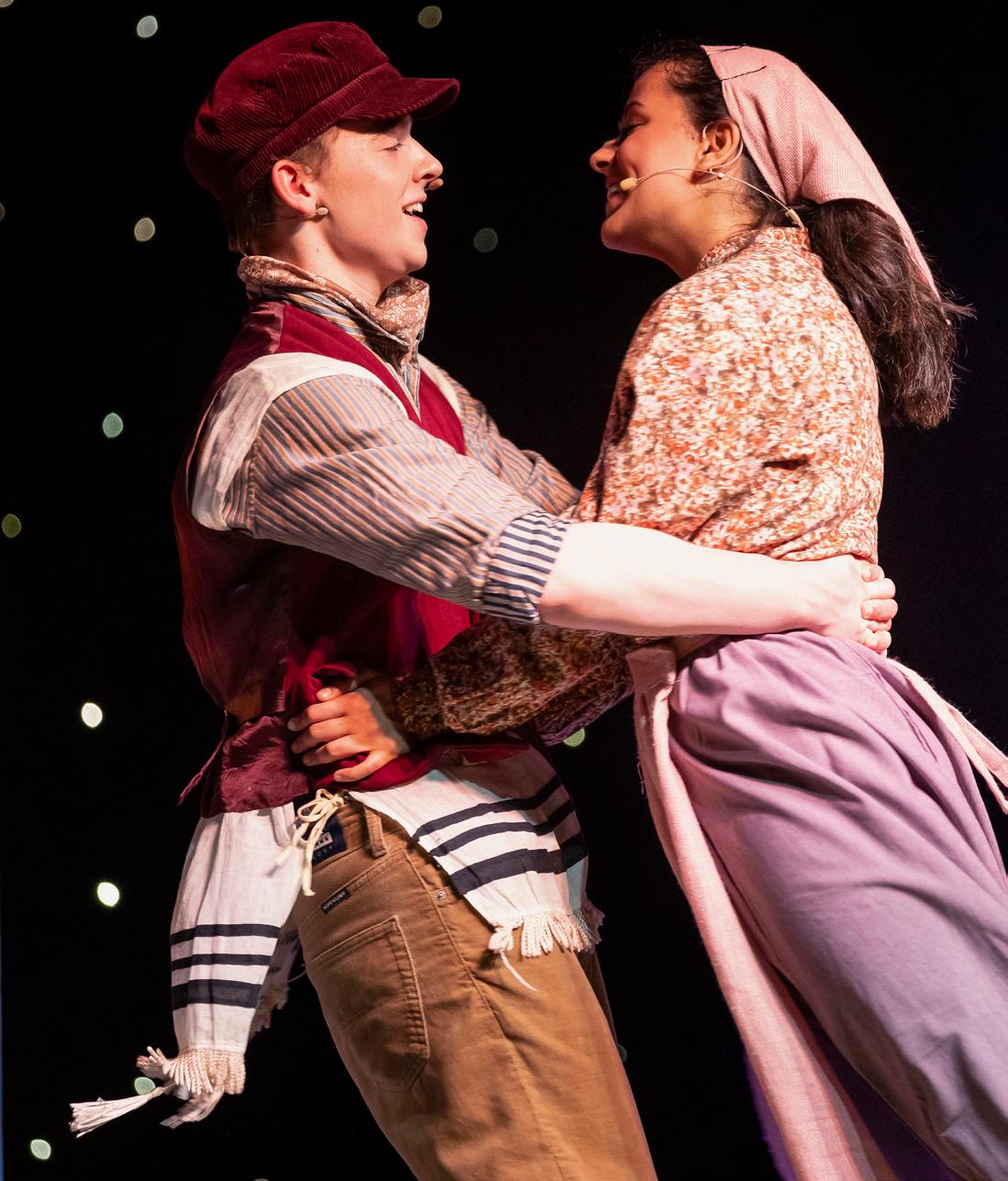
Written examination: 2 hours 30 minutes 40% of the qualification 80 marks
• Live theatre evaluation – choice of performance
• Practical exploration and study of a complete performance text – focusing on how this can be realised for performance
Practical exploration and interpretation of another complete performance text, in light of a chosen theatre practitioner – focusing on how this text could be reimagined for a contemporary audience
• Centre choice of 15 performance texts
• Choice of eight practitioners
18
ECONOMICS
Examination Board: Edexcel Mr C White – Head of Business and Economics Specification: 9EC0 cwhite@kings-rochester.co.uk
The A Level Economics course is divided into four themes and consists of three externally examined papers. Pupils are introduced to Economics through building knowledge of core microeconomic and macroeconomic concepts. The course provides pupils with the knowledge that will enable them to better understand the world in which they live.
Theme 1
This theme focuses on microeconomic concepts. Pupils will develop an understanding of:
• The nature of economics
How markets work
• Market failure
• Government intervention
Theme 2
This theme focuses on macroeconomic concepts. Pupils will develop an understanding of:
• Measures of economic performance
• Aggregate demand
Aggregate supply
National income
• Economic growth
• Macroeconomic objectives and policy
Theme 3
This theme develops the microeconomic concepts introduced in Theme 1 and focuses on business economics. Pupils will develop an understanding of:
• Business growth Business objectives
• Revenues, costs and profits
• Market structures
• Labour market
• Government intervention
Theme 4
This theme develops the macroeconomic concepts introduced in Theme 2 and applies these concepts in a global context. Pupils will develop an understanding of:
• International economics
• Poverty and inequality
• Emerging and developing economies
Financial sector
• Role of the state in the macroeconomy

19
ENGLISH LITERATURE
Examination Board: OCR Mrs E McCarthy – Head of English Specification: H472 emccarthy@kings-rochester.co.uk
In this specification, pupils are encouraged to develop their interest in, and enjoyment of, literature and literary studies. The A Level course also promotes a logical and challenging transition from IGCSE study, developing learners’ critical analysis skills for progression into higher study. There is a good balance between examined units (80%) and coursework (20%) and pupils will gain insights into the traditions of literature in English through a broad range of texts from different periods. Pupils will develop their understanding and key skills using a variety of methods including: close-reading, research, the study of critical essays, group discussions and film adaptations.
Unit 1: Drama and Poetry pre-1900 (Examination) 40%
In this unit, pupils will study one play by Shakespeare in addition to one pre-1900 drama text and one pre1900 poetry text. The first section of this unit requires pupils to demonstrate their detailed knowledge and understanding of a Shakespearean play. We are currently studying ‘Twelfth Night’. The second section requires them to establish connections between one pre-1900 poetry text and another pre-1900 drama text. At the moment, groups are enjoying Ibsen’s ‘A Doll’s House’ and Chaucer’s ‘A Merchant’s Prologue and Tale’.
Unit 2: Comparative and Contextual Study (Examination) 40%
This examination is split into different study areas. Currently, we focus on the exciting unit of Dystopian Fiction. Pupils will study two novels for the course, although they will be encouraged to read more widely. The examination will include an unseen close-reading section and a comparative essay section.
Unit 3: Coursework 20%
Pupils are required to study three texts grouped to facilitate links or contrasts. The three texts must include one prose text, one poetry text and one drama text. All texts must have been published or performed after 1900 and at least one must have been published or performed after 2000. As an example, our current A Level groups are studying Alan Bennett’s ‘The History Boys’ for Task 1. For Task 2, pupils will be drawing comparisons between Chimamanda Ngozi Adichie’s novel ‘Purple Hibiscus’ with the poetry of Seamus Heaney in ‘Death of a Naturalist’.
• Task 1: One critical piece with commentary (1000 words)
• Task 2: A comparative essay about two texts (2000 words)
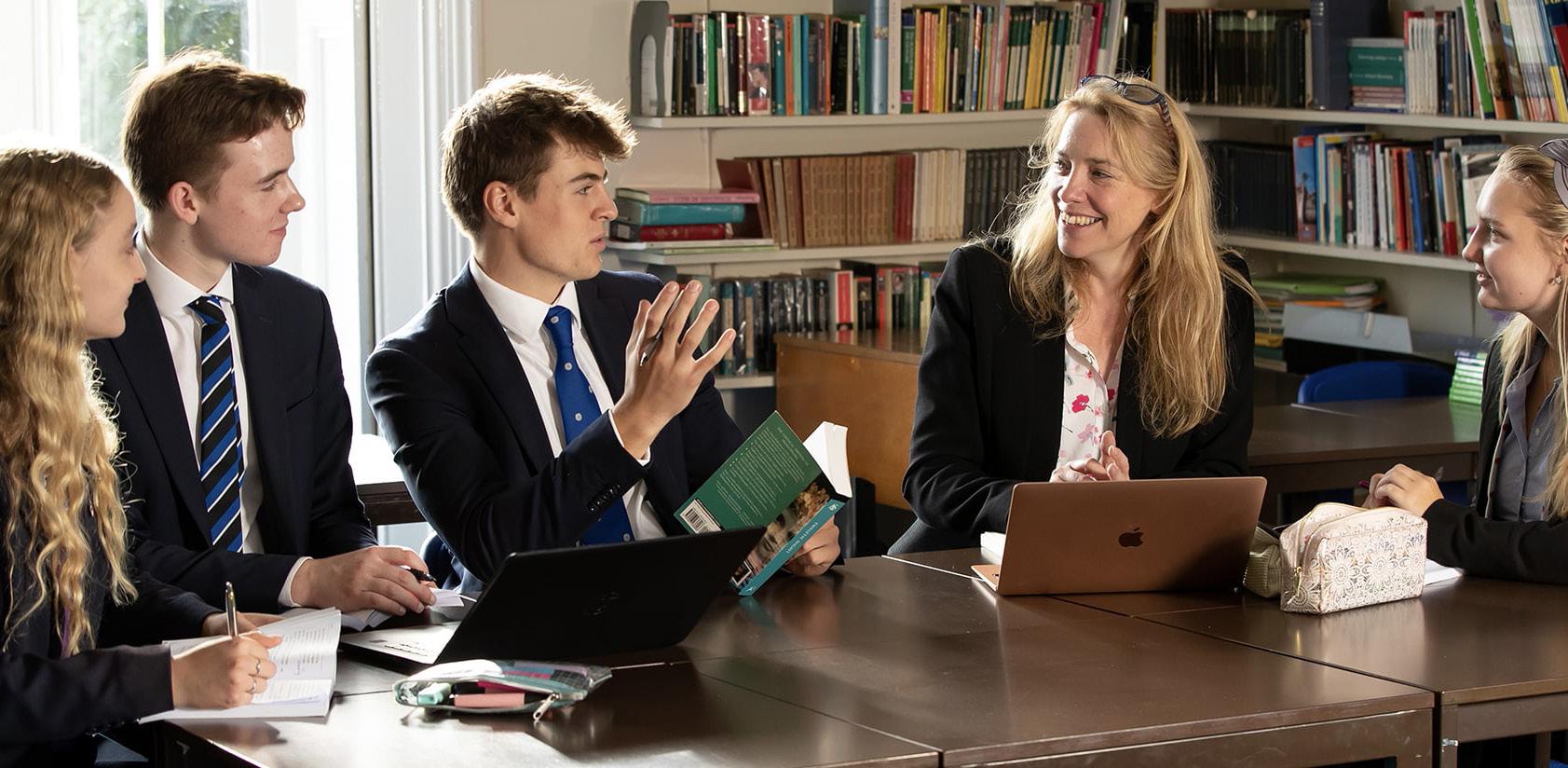
20
FRENCH
Examination Board: AQA
Ms A Warne - Head of French Specification: 7652 awarne@kings-rochester.co.uk
The A level French course at King’s is designed to enhance pupils’ linguistic skills and promote their capacity for critical thinking on the basis of their knowledge and understanding of the language, politics, culture, heritage, identity and society of the countries where French is spoken. They will develop control of the language to convey meaning, using spoken and written skills, including an extended range of vocabulary to become increasingly confident, accurate and independent users of French.
Skills developed at A level
Above and beyond the language skills you gain, by the end of the course you will have developed critical thinking skills, reasoning skills and multi-tasking skills that employers and universities really value. In addition, strong communication skills, being precise and an international outlook are all developed in A level French.
Components of the course
The course includes the study of two French works: a literary text and a film. At King’s we currently study the highly popular, contemporary novel ‘No et Moi’ by Delphine de Vigan and the internationally acclaimed shockfilm ‘La Haine’ by Matthieu Kazovitz.
An Individual Research Project on an aspect of Francophone Society is also undertaken. Pupils choose a question or topic that interests them and the aim is to develop a passion for their chosen area and to develop independent research skills. The IRP is discussed with the examiner as part of the speaking examination at the end of the course.
The examinations at the end of the course also include reading, writing, and listening papers on current trends in French-speaking society and a writing paper on the novel and the film that is studied.
Entry requirements
Ideally, you will have a GCSE Grade 6 or above.
University courses and professional
Universities love A level French pupils, and you can use it to apply for a wide range of courses that you might not first have thought of – medicine, law, accountancy, business – all of these courses appreciate the skills acquired through studying French. Increasingly, we see our former students maintaining and extending their study of French as a subsidiary subject at university such as Engineering with French, Maths with French and Business with French.
As so much business is now done on an international level, companies are always on the lookout for employees who can easily converse with overseas colleagues. Modern languages graduates embark on a number of rewarding careers as translators, interpreters, researchers and teachers. However, a high level of competency in French opens doors to careers in all areas such as publishing, business, international charity work, law and banking.

21
GEOGRAPHY
Examination Board: AQA Miss L Costelloe – Head of Geography Specification: 9GEO lcostelloe@kings-rochester.co.uk
Geography is a diverse subject, which is multi-skilled. Due to this and its cross-curricular links, it combines well with many other subjects. It is very popular with and well respected by employers and can lead to a variety of job prospects.
The course builds on topics studied at GCSE, so pupils will need to have studied the subject at GCSE level and it is recommended that they have achieved a minimum grade 6, but 7+ is desirable. Pupils are expected to be able to complete structured extended writing, in response to a variety of questions, using appropriate geographical theory, analysis and examples.
Course Outline
Paper 1 (40%)
• Section A: Water and carbon cycles
• Section B: Coastal systems and landscapes or glacial systems and landscapes
• Section C: Hazards
Written examination: 2 hours 30 minutes
Paper 2 (40%)
• Section A: Global systems and global governance
Section B: Changing places
Section C: either a) Contemporary urban environments b) Population and the environment or c) Resource security
• Written examination: 2 hours 30 minutes
Coursework and Fieldwork (20%)
Pupils are required to undertake an independent investigation and complete a 3000-4000 word report. Pupils will need to define a question or issue for investigation, relating to the course content, and write a report. The investigation will incorporate fieldwork data (which is likely to be collected as part of a group but can be collected individually) and pupils’ own research and/or secondary data. The report will include analysis, evaluation, data presentation and extended writing. In order to support this independent investigation as well as the course content, pupils are expected to complete four days of fieldwork. This trip will be undertaken in the summer term of the Lower Sixth year. It will be a compulsory trip and is expected to cost approximately £300-£400.
In addition, there is an opportunity for Lower Sixth and Upper Sixth pupils to attend a variety of non-compulsory fieldtrips to support their geographical studies. Recent destinations include: Iceland, China, South Africa and Costa Rica. All trips will take place during the October half-term or occasionally the February half-term.

22
GERMAN
Examination Board: AQA
Frau H Gibson – Head of German Specification: 7662 hgibson@kings-rochester.co.uk
The A Level course in German focuses on language, culture and society and builds on the knowledge, understanding and skills gained at the previously completed GCSE course. Alongside the topic-specific and general vocabulary and grammar, the A Level course teaches the pupils about German-speaking society, how it has been shaped socially and culturally and how it continues to change.
As listed in the topic overview below, pupils initially learn about society in German-speaking Europe, as well as the artistic life of these countries. In the second year, further aspects of the social background are covered alongside the political landscape in Germany, both in relation to Germany itself and its place in Europe.
Pupils are taught about reunification and its consequences as an example of how Germany’s past influenced its present state. A film and a book are discussed and analysed to complement the topic areas. A Level German combines the learning of a language and societies in those European countries where German is spoken with the acquisition of important transferable skills, i.e. communication, critical thinking, research skills and creativity.
Course Outline
Topic 1: Aspects of German-speaking society
Topic 2: Artistic culture in the German-speaking world
Topic 3: Multiculturalism in German-speaking society
Topic 4: Aspects of political life in the German-speaking world
Assessment
Paper 1
• Listening, Reading and Writing.
Listening and Reading tasks based on the four topic areas.
Translation into English.
• Translation into German.
Paper 2
Writing – Essay questions based on the book and the film.
Paper 3
Speaking – One of the four topic areas will be discussed based on a stimulus card, along with discussion on the Individual Research Project.

23
HISTORY
Examination Board: OCR
Dr K Thomson – Head of History and Politics
Specification: H505 kthomson@kings-rochester.co.uk
Pupils will follow a Modern and Early Modern outline consisting of the following areas:
• Liberals, Conservatives and the Rise of Labour 1846–1918
• Popular Culture and the Witchcraze of the 16th and 17th Centuries France 1814 – 1870
Topic-based essay (3,000 – 4,000 words)
Unit 1
A British unit of study and enquiry making up 25% of the overall A level marks. The examination for this unit will be 60 minutes long and will comprise a source-based task and an essay-based piece of work.
Unit 2
A non-British period study which makes up 15% of the overall marks and is essay-based in the examination, which is an hour long.
Unit 3
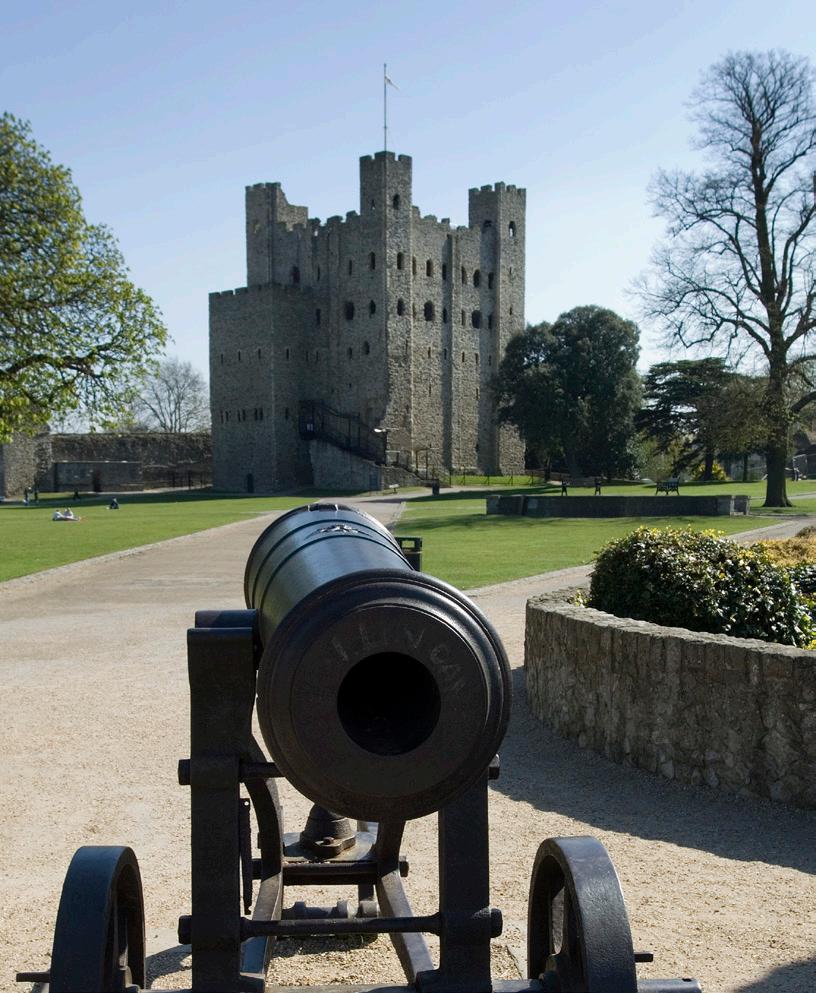
A thematic study and an interpretation covering a period of at least 100 years and three in-depth studies of events, individuals and issues that are important within that period. This paper makes up 40% of the A level and is examined over 2 ½ hours.
Unit 4
A 3,000 – 4,000 word essay on a topic recommended by the staff and Board. Where particular effort is shown, this work may be on a non-taught topic that the pupil is particularly interested in. This is an internally-assessed unit later moderated by the Board, worth 20% of the overall A level.
Pupils benefit academically from the breadth of historical study as well as studying a variety of interesting historical contrasts. The course is designed to give pupils opportunities to:
• Acquire knowledge and understanding of the human past Investigate historical events, people, changes and issues
• Develop understanding of how the past has been presented and represented
• Use historical sources critically in their historical context
• Draw conclusions and appreciate that these and other historical conclusions are liable to reassessment in the light of new and interpreted evidence
Candidates contemplating studying History should be aware that A Level requires pupils to write at much greater length than at GCSE. Good essay writing skills are essential to A level success. Therefore, at least grade 6 in GCSE History and grade 6 in English Language is recommended.
A qualification and knowledge of History is useful preparation for a number of careers. The argumentative and analytical skills that are learned in History are essential in particular jobs such as Law, Journalism, Broadcasting, Government, Politics and Civil Service.
In addition, many companies are now actively looking for pupils who have taken History at A level and beyond, because their training and skills particularly fit them for careers in management and administration. Whatever you decide to do, to understand anything properly you must have knowledge of its past and the ability to interpret it. An A level in History is never wasted.
24
LATIN
Examination Board: OCR
Mr C Carroll – Head of Classics Specification: H443 ccarroll@kings-rochester.co.uk
‘Studying Mediterranean antiquity superbly equips individuals to think socio-politically and to persuade other people orally, visually and in writing. It hones transferrable skills like source criticism and culturally relativist analysis. It’s a perfect A level to do with any other subject because the Greeks invented all academic disciplines including Medicine and Material Science. It gets school-leavers and graduates great jobs and gives them nourishing and beautiful brain-food for non-working hours for life.’
Edith Hall, Classics Professor at Kings College London
The study of Latin continues on from GCSE. Language lessons introduce further elements of grammar so that, by the end of the course, pupils are able to translate unseen passages of unrevised Latin. Alongside the study of the language itself is the study of the set texts. These are both prose and verse. Pupils will study a speech of Cicero, considering not just its meaning but also its socio-political context and its literary value. The verse selection is from the Aeneid, one of the greatest works of Western poetry. Pupils will learn to give a personal response to the poetry and its genre.
Assessment
Component 1:
Unseen translations in Latin provide students with the opportunity to showcase their linguistic and interpretive skills by translating a previously unseen passage without prior knowledge. This challenging exercise not only assesses their command of Latin grammar and vocabulary but also hones their ability to comprehend and convey the nuanced meanings embedded in unfamiliar texts.
Component 2:
Prose composition or comprehension. In the composition paper candidates will be required to translate a short passage of English into Latin prose. For the comprehension paper candidates will answer questions about a passage of Latin prose.
Component 3:
It is our pleasure to introduce you to the rich and compelling world of Cicero’s oratory, particularly his renowned speech, “Pro Caelio.” In this captivating text, Cicero addresses a complex legal case involving the young and ambitious Clodius Pulcher and his alleged attempt to poison one of Rome’s most distinguished citizens, Quintus Caecilius Metellus Celer. Cicero, known for his eloquence and strategic brilliance, takes on the defense of Marcus Caelius Rufus, a rising political figure accused of orchestrating the poisoning.
Component 4:
We will introduce you to one of the most compelling and enduring works of Latin literature – Book 2 of Virgil’s epic poem, the “Aeneid.” In this literary masterpiece, Virgil transports us to the tragic aftermath of the Trojan War. The narrative unfolds within the city of Troy as it falls to the Greek forces. Aeneas, our hero and the Trojan prince, becomes the central figure as he navigates the destruction of his homeland and sets out on a fateful journey that will eventually lead to the founding of Rome.
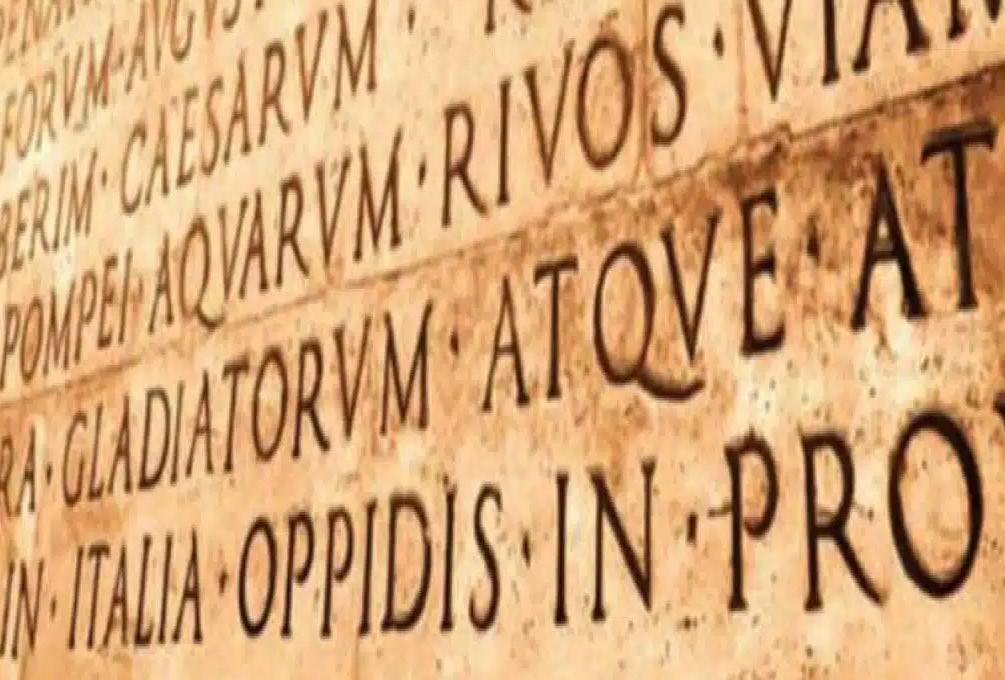
25
MATHEMATICS
Examination Board: Edexcel Mr P Stevens – Head of Mathematics Specification: 9MA0 pstevens@kings-rochester.co.uk
Pupils study both Statistics and Mechanics as part of the applied mathematics side.
A Mathematics qualification post GCSE should be considered essential for pupils thinking of further university study in the Sciences, Engineering, Finance and of course, Mathematics itself. It is also a recommended qualification for Medicine.
Pupils opting to take A Level Mathematics must attain at least grade 7/8 in GCSE Mathematics. A low 7 may not be sufficient. Motivation is key to success in this subject. By this we require you to be inquisitive and reflective, always looking for the logic that makes sense of the symbols. You probably enjoy puzzles because they are challenging and want to know where any errors lie. We would like pupils to be able to write their solutions making use of digital technology. For this, we ask that pupils have a ‘pen-enabled’ device.
The Mathematics Department follows the Edexcel Specification and offers the following courses:
A Level Mathematics: 3 Examinations, 2 Pure and 1 Applied.
FURTHER MATHEMATICS
Examination Board: Edexcel Specification: 9FM0
Further Mathematics A Level should be considered by pupils likely to be following a degree course with significant mathematical content. It is a fast-paced course and essentially the quantity of two A Levels, so should only be considered by pupils who have significant ability in the subject and are willing to abide by the motto ‘Age quod agis!’ or ‘Do what you are doing!’
Further Mathematics pupils will be expected to complete A Level Mathematics in the Lower Sixth and continue onto Further Mathematics in the Upper Sixth.
A Level Further Mathematics: 4 Examinations, 2 Pure and 2 Options.
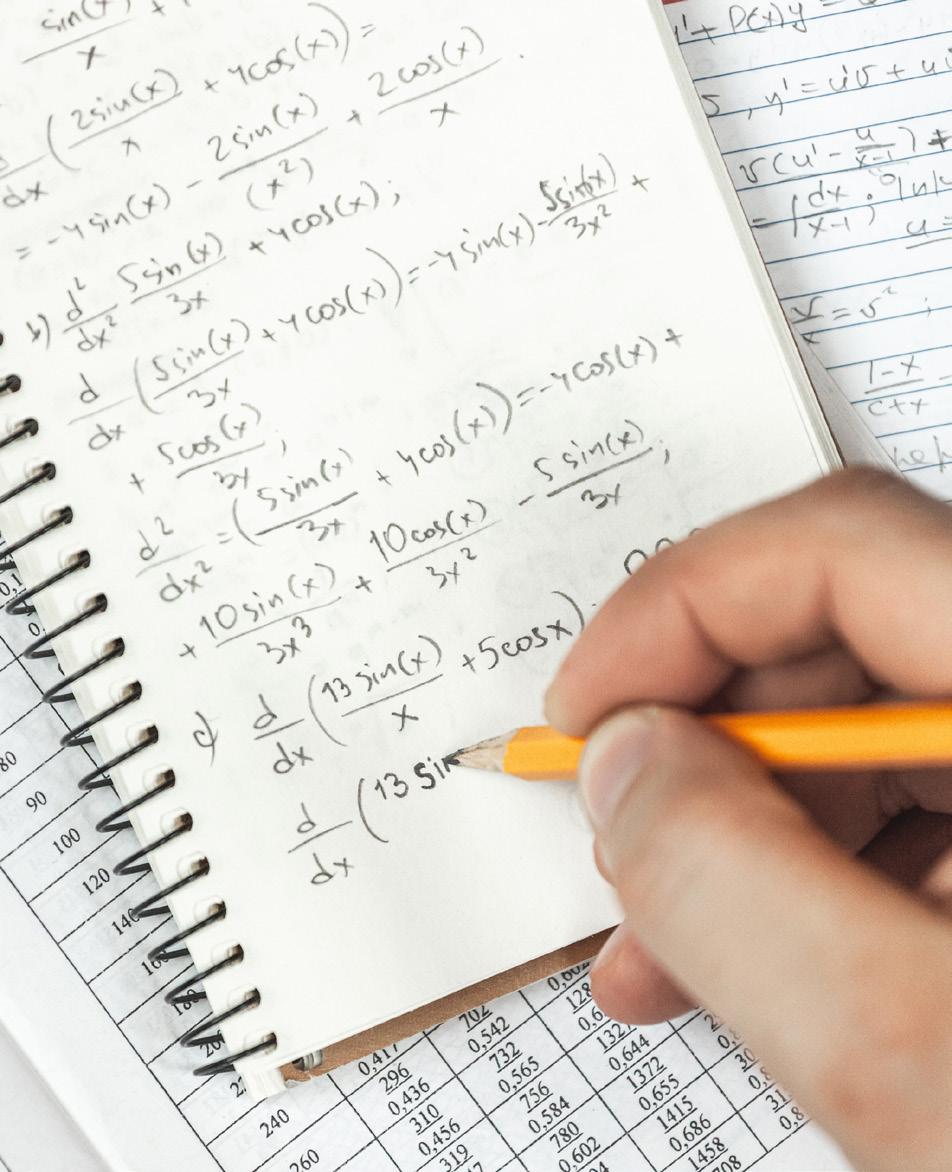
The options include statistics, mechanics, decision mathematics or further pure. A group decision on option choices is the normal pattern.
Pupils must obtain an 8/9 at GCSE and they will be expected to achieve at least an A grade for A Level Mathematics in the Lower Sixth. Further Mathematics is usually taken as a fourth subject. However, in some cases it may be more appropriate for it to be included within the three subjects. This would depend upon the individual and would need to be discussed with the Head of Mathematics and the Deputy Head Academic.
It is possible for a top A Level Mathematics pupil to do the A Level in year 1. If this is desired, pupils should indicate Further Mathematics as their choice.
26
MUSIC
Examination Board: Cambridge International Examinations (CIE)
Specification: 9483
Mr J Mountford – Director of Music jmountford@kings-rochester.co.uk
Studying Music in the Sixth Form requires a great deal of independent endeavour and suits those who gain an excellent grade at GCSE and are at least a good Grade 6 on their main instrument. The course is rigorous and requires pupils to be curious about a wide range of music and to develop independent research skills.
• Allows for greater depth of study and learning
Allows for development of a broad range of skills and understanding
• It encourages independent and self-directed learning
• It encourages you to think laterally, critically and creatively
• The Personal Study component is unique and allows you to maximise the impact of your strengths on your final grade
What’s Involved
Listening and Analysis (30%)
You will cover a range of music drawn from the Western Classical Tradition, Popular Music, Jazz, World and Folk music. The set works for 2026 are:
• Johann Sebastian Bach Orchestral Suite No. 1, BWV 1066
• Antonio Vivaldi Concerto in G minor Op. 3 No. 2 RV 578 for two violins, cello, strings and continuo
• Antonín Dvořák Symphony No. 9 in E minor op. 95 ‘New World’
Two songs: Florence Price Travel’s End; Margaret Bonds Stopping by Woods on a Snowy Evening Michael Nyman MGV (Musique à Grande Vittesse)
The current topics studied are The Classical Symphonies and Music in the 19th Century, focusing either on Opera or Music for Orchestra. Essays are set regularly and you will practice aural tests and compare recordings. Musical performance practice is a strong feature of this part of the course.
Performing (12%)
All candidates have the opportunity to perform on their first/second instruments as soloist, accompanists or playing with other musicians.
Composing (8%)
Two compositions, each 1-2 minutes in length.
Personal Study (50%)
Candidates work over a prolonged period of time on a personal project and must choose two of the following (worth 25% each):
Performing – Up to 20 minutes and a 1,750 word written project.
• Free Composition – One 6-8 minute composition.
• Dissertation – 3,500 word essay on a topic of your choice.
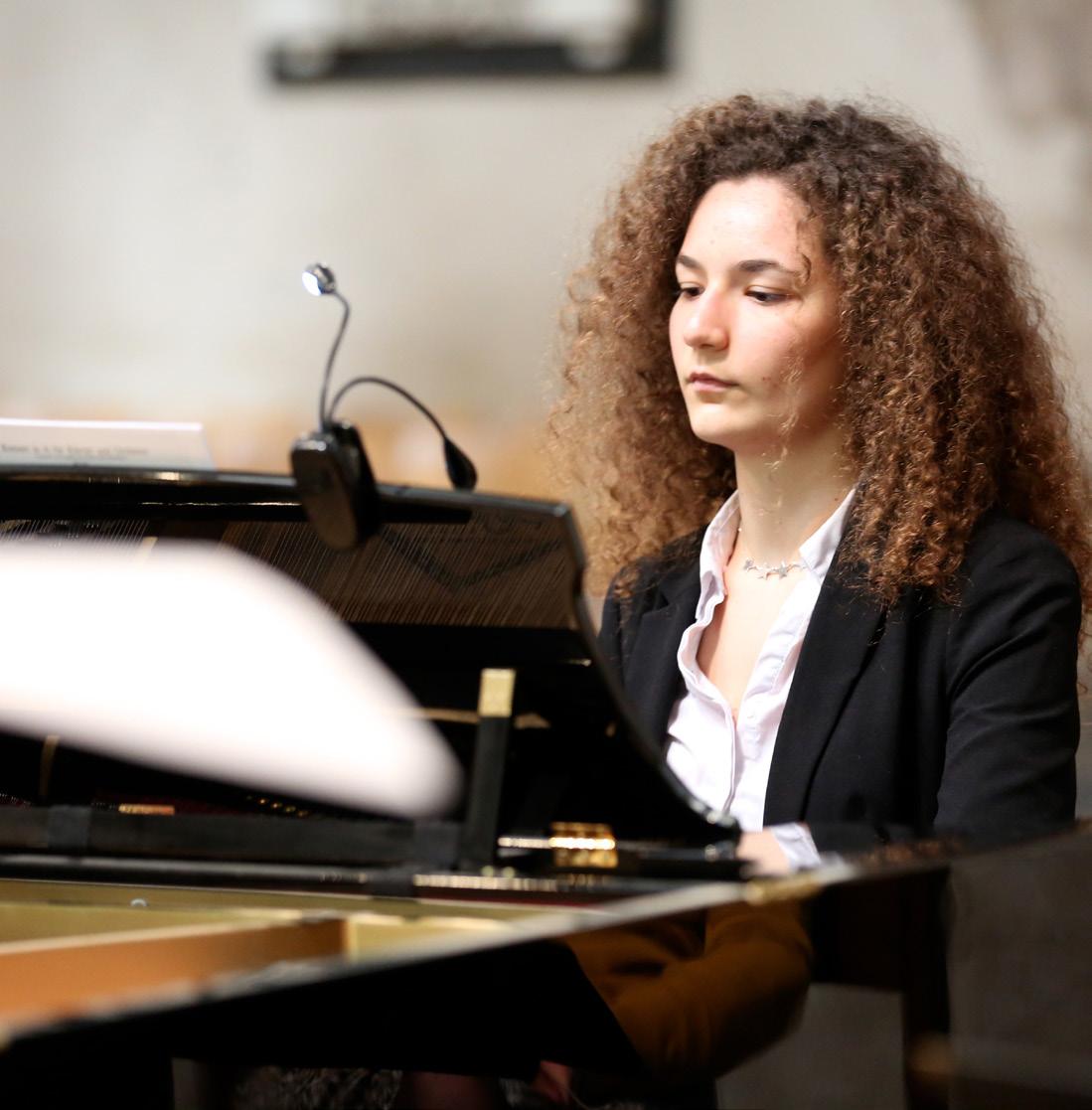
27
PHYSICAL EDUCATION
Examination Board: BTEC Nationals Ms A Pine – Head of Physical Education
Specification: Sport Extended Certificate apine@kings-rochester.co.uk
These courses offer pupils with a genuine interest in sport, as well as those looking to develop breadth in their options, the opportunity to study a challenging course combining both academic and practical skills. The course is split into assignment-based assessments and external exam units, which can be taken at least twice over the course duration. If all goes to plan, you might not have any BTEC exams in the summer of the Upper Sixth, allowing you to focus your revision on your other A Level subjects. Pupils opting for the BTEC course will benefit from gaining employability skills alongside academic study. Problem-solving, intra and inter-personal skills feature highly in this course in addition to the ability to read technical texts, analyse and write effectively.
Extended Certificate (Equivalent to 1 A Level)
ANATOMY AND PHYSIOLOGY – EXAM UNIT
• The muscular system
The respiratory system
The cardiovascular system
• The energy systems
• The skeletal system
Opportunity to take the exam up to three times in the two year period
PROFESSIONAL DEVELOPMENT IN THE SPORTS INDUSTRY – COURSEWORK UNIT
• Career and job opportunities in sport
• Using a skills audit form to create a career development plan
• Undertake a recruitment activity to understand the processes related to a successful job offer in a chosen career pathway
Three assignments (one related to each area)
Opportunity to complete assignments to a pass, merit/distinction grade
Opportunity to resubmit assignments career and job opportunities in sport
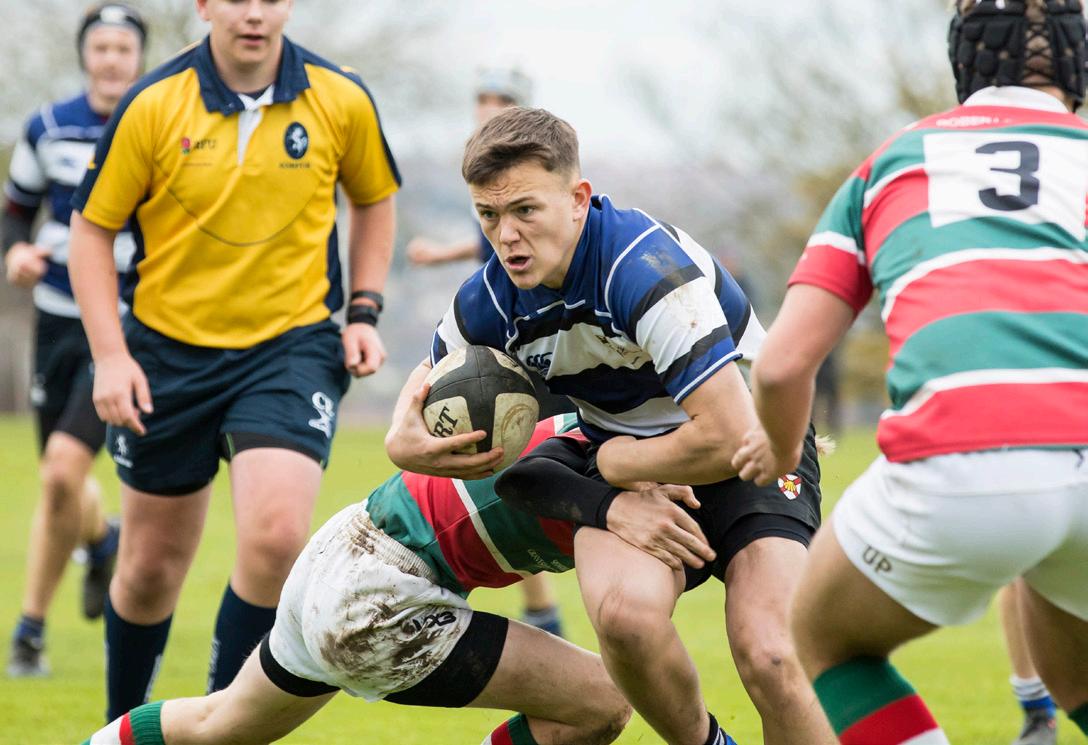
FITNESS, TRAINING AND PROGRAMMING FOR HEALTH SPORT AND WELLBEING – EXAM UNIT
Lifestyle factors
Screening processes
• Nutritional needs
• Components of fitness
• Designing training programmes
Scenario released a week before the exam
Opportunity to take notes into the exam
APPLIED FITNESS TESTING – COURSEWORK UNIT
• Principles of fitness testing
• Factors affecting administration of tests
• Validity, reliability and suitability
Perform a range fitness based tests, working with elite athletes compare results and set targets
Three assignments (one related to each area)
Opportunity to complete assignments to a pass, merit/ distinction grade
Ongoing teacher support throughout all assignments
Opportunity to resubmit assignments
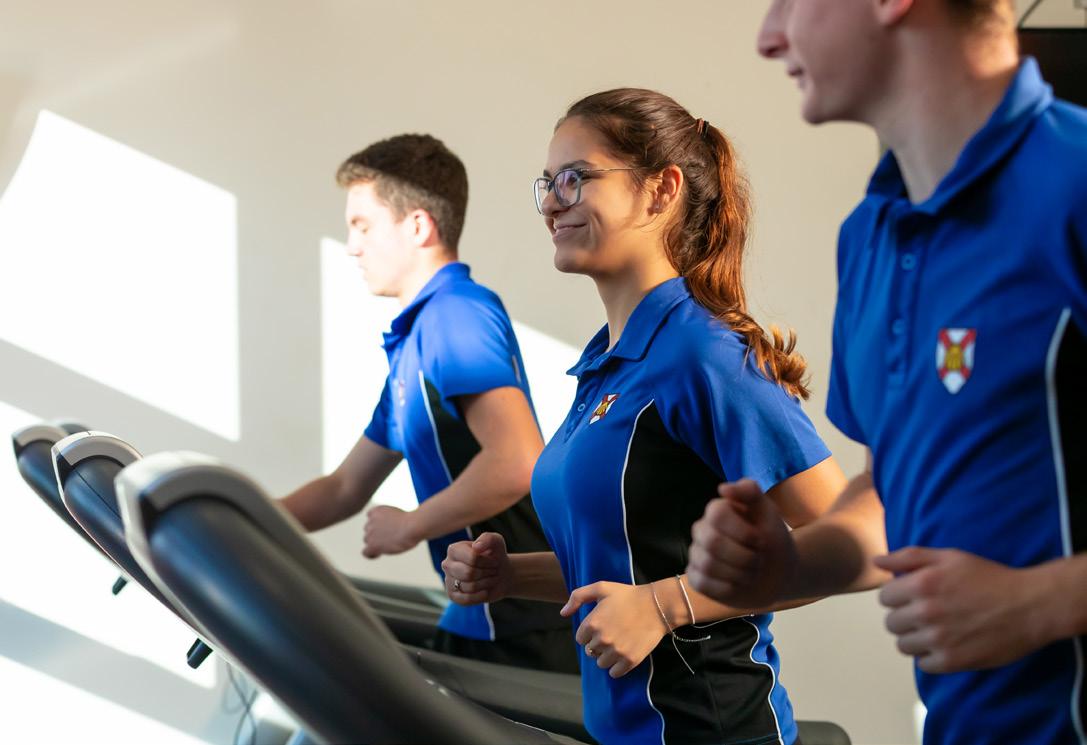
28
PHYSICAL EDUCATION
Examination Board: BTEC Nationals Ms A Pine – Head of Physical Education
Specification: Level 3 Sports Diploma apine@kings-rochester.co.uk
National Level 3 Sports Diploma (equivalent to 2 A Levels)
This course runs in parallel in the timetable with the Extended Certificate. For the National Diploma Level 3, you must study nine units over the two years. Some units are mandatory, some units are optional and four of the units are the same as the units studied in the Extended Certificate.
Mandatory Units
• Anatomy and Physiology – Exam Unit
• Fitness Training and Programming – Exam Unit
• Investigating Business in Active Sport and Leisure
– Exam Unit
Professional Development in the Sports Industry
• Sports Leadership
• Skill Acquisition in Sport

Optional Units (choose three)
• Application of Fitness Testing
• Sports Psychology
• Practical Sports Performance
• Coaching for Performance Research Methods in Sport
• Sports Events Organisation
• Research Project in Sport
• Sports Injury Management
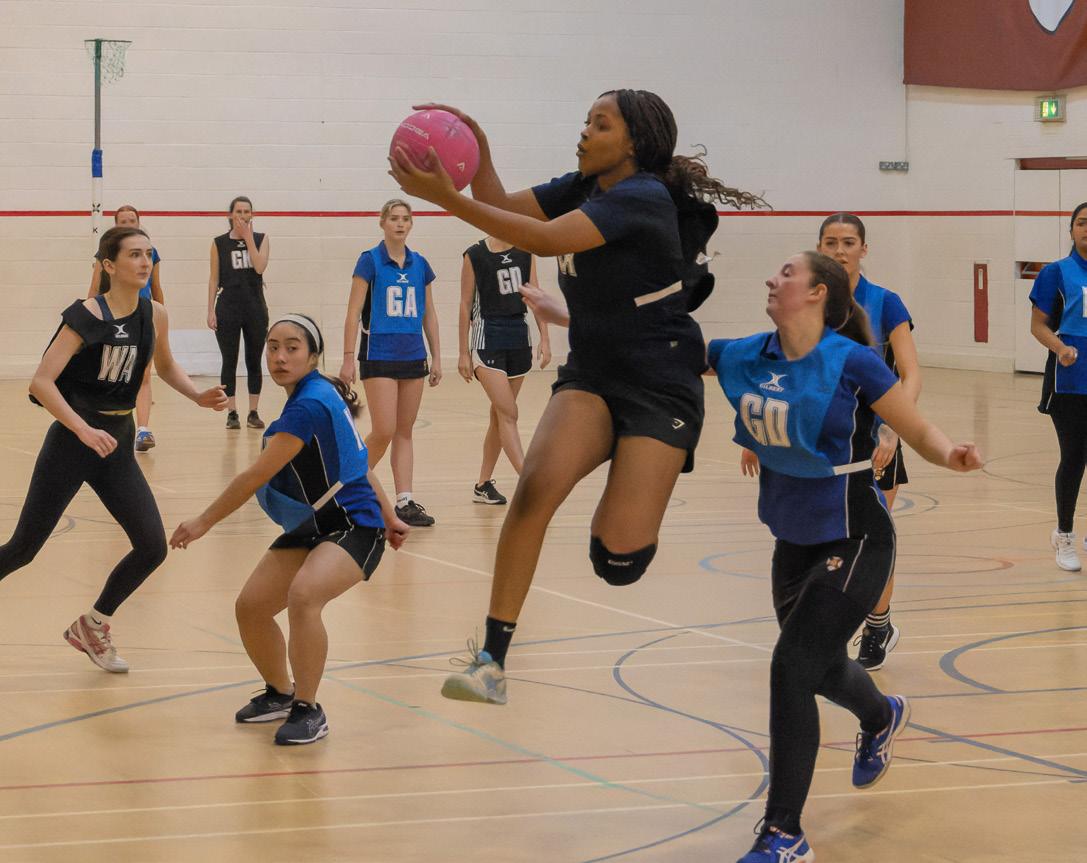
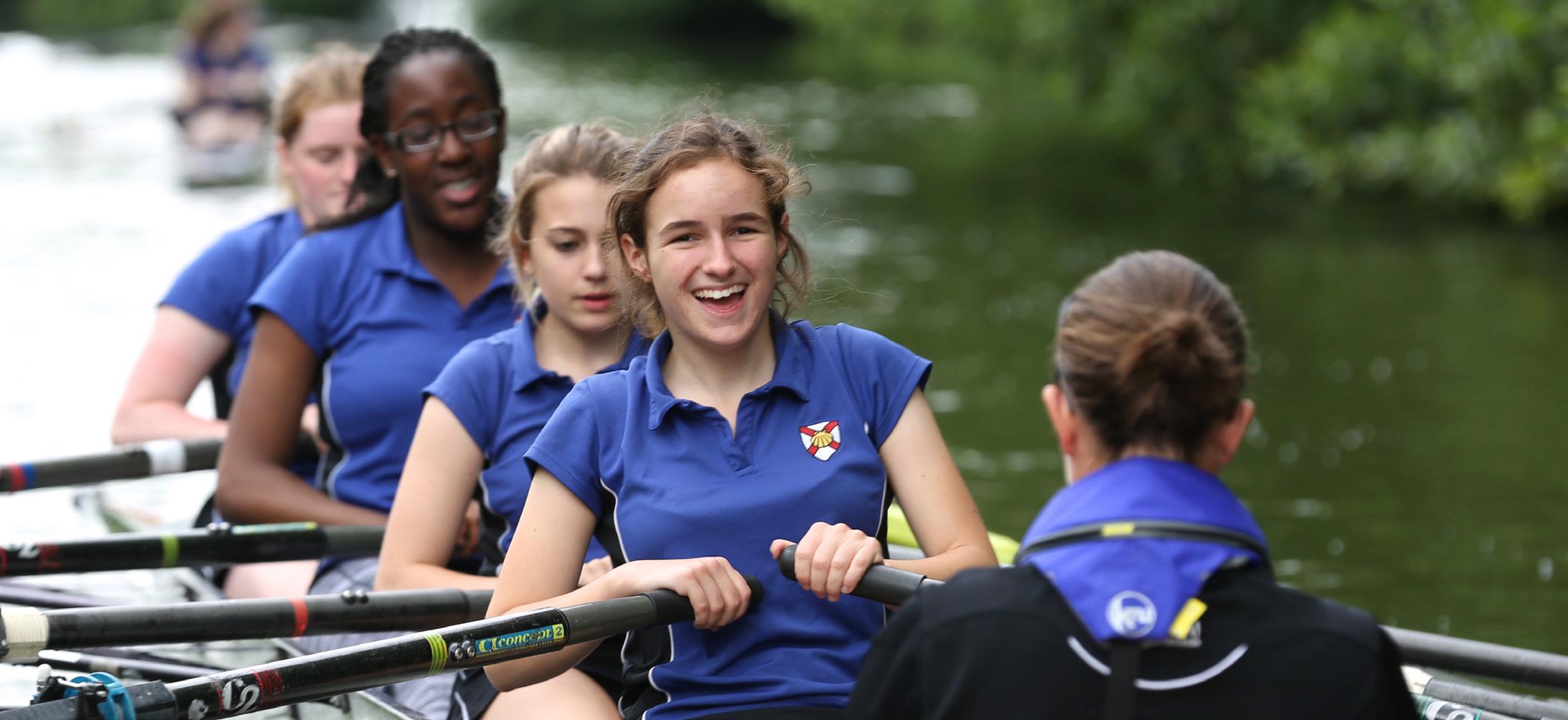
29
PHYSICS
Examination Board: AQA
Mrs E Parren – Head of Physics Specification: 7408 eparren@kings-rochester.co.uk
Physicists explore the fundamental nature of almost everything we know of. They probe the furthest reaches of the earth to study the smallest pieces of matter. Join them to enter a world deep beneath the surface of normal human experience.
Topics covered
A Level Physics lasts two years, with examinations at the end of the second year. Below are the topics covered in each year.
First year of A Level
Measurements and their errors
• Particles and radiation
• Waves
• Mechanics and energy
• Electricity
Second year of A Level
Further mechanics and thermal physics
• Fields
• Nuclear physics
• Astrophysics
Physics, like all sciences, is a practical subject. Throughout the course, you will carry out practical activities including:
Investigating interference and diffraction of laser light
Measuring acceleration due to gravity
• Investigating systems that oscillate
• Investigation of the links between temperature, volume and pressure
• Safe use of ionising radiation
• Investigating magnetic fields
These practicals will give you the skills and confidence needed to investigate the way things behave and work. It will also ensure that if you choose to study a Physics-based subject at university, you’ll have the practical skills needed to carry out successful experiments in your degree.
Examinations
There is no coursework on this course. However, your performance during practicals will be assessed. There are three examinations at the end of the two years for A Level, all of which are two hours long. At least 15% of the marks for A Level Physics are based on what you learned in your practicals.
Entry requirements
A Level Physics builds on the work done in GCSE Science and Maths, so you’ll need grade 7 in Physics or Double Science and a grade 7 in Mathematics.

30
POLITICS
Examination Board: Edexcel
Dr K Thomson – Head of History and Politics Specification: 9PL0 kthomson@kings-rochester.co.uk
Politics as an A Level allows pupils to develop an awareness and understanding of the exciting, ever-changing and sometimes confusing world of Politics from both a UK and a US perspective, as well as from an ideological angle. It is a subject that reacts to the latest developments, and gives pupils the opportunities to interact with some of the big issues facing us today; such as Brexit, the United Nations and issues with the House of Lords. Both Politics teachers are experienced examiners.
Following the Edexcel Politics A Level, in the Lower Sixth, pupils will study the political systems and government of the United Kingdom. In the second half of the Lower Sixth we also study three core Political Ideologies (Conservatism, Liberalism and Socialism) and one optional Political ideology, currently Feminism.
In the Upper Sixth, pupils will study global politics, covering institutions such as the IMF, UN and NATO, environmental policies and emerging economies. Politics field trips include Parliament, the Supreme Court, political conferences and Congress to Campus. There are also regular sessions with political speakers.
A Level Politics enables pupils to develop a wide range of skills including the abilities to comprehend and interpret political information; analyse and evaluate; identify connections, similarities and differences between the areas studied; select relevant material, and construct effective arguments using appropriate political vocabulary.
As a subject this complements the study of History and Economics directly, whilst the skills and topics will also be useful for English and Religious Studies. As such, Politics will be a useful subject for many university and job applications such as Law, Journalism, PPE, Broadcasting and the Civil Service.
Paper 1
UK Politics and Core Ideologies
Paper 3
3B - Global Politics (comparative)
Entry Requirements
Paper 2
UK Government and Optional Ideologies
Given the nature of the subject matter and the examinations attached to this, good essay writing skills will be important. Therefore the minimum of grade 6 in GCSE English is recommended for those contemplating this course. It is expected that all pupils will stay abreast of current affairs in the UK and internationally.

31
PSYCHOLOGY
Examination Board: OCR Miss V Burgess - Lead Teacher of Psychology Specification: H567 vburgess@kings-rochester.co.uk
Elements of this course include research and mathematics as well as studying different cases of psychological findings, some done in an era where the ethics of the study was questionable. You will undertake your own practical research and present findings to your teacher and peers. There are elements of the physiology of the brain, looking at how we learn and debates on nature versus nurture when researching behaviour. Another part of this course deals with mental health, looking at the beliefs surrounding mental health, the physical effects on and of mental health and the different categories of mental health disorders.
Pupils will develop the following throughout A Level Psychology:
Essential knowledge and understanding of different areas of Psychology and how they relate to each other. Demonstrate a deep appreciation of the knowledge and understanding of methods used in case studies and any issues surrounding the different methods.
• Competence and confidence in a variety of research methods as well as the mathematical skills to attain and interpret data.
• Interest in and enthusiasm for the subject, including developing an interest in further study and careers associated with psychology.
Components of the course
There are 3 components which the course covers in 2 years, these include the following:
Component 1: Research methods.
This component develops knowledge and understanding of planning, conducting, analysing and reporting psychological research across a range of experimental and non-experimental methodologies and techniques. Pupils carry out their own small-scale practical activities. Pupils need to be familiar with the four main techniques for collecting/analysing data: Self-Report, Experiment, Observation and Correlation.
Component 2: Psychological themes through core studies.
Introduces some of the central areas of investigation in psychology organised in ten key themes, each represented by a classic and a contemporary core study. The core studies reflect the contribution of psychology to an understanding of individual, social and cultural diversity.
Component 3: Applied Psychology.
Pupils study Issues In Mental Health, Child Psychology and Criminal Psychology. Environmental and Sports Psychology are not an option here.
Entry requirements
Pupils awarded a minimum of Grade 6 in triple Science Biology or Grade 6 in Dual Science. Pupils will also need a Grade 6 in mathematics due to the mathematical content of the course, and a minimum of a Grade 6 in English language.
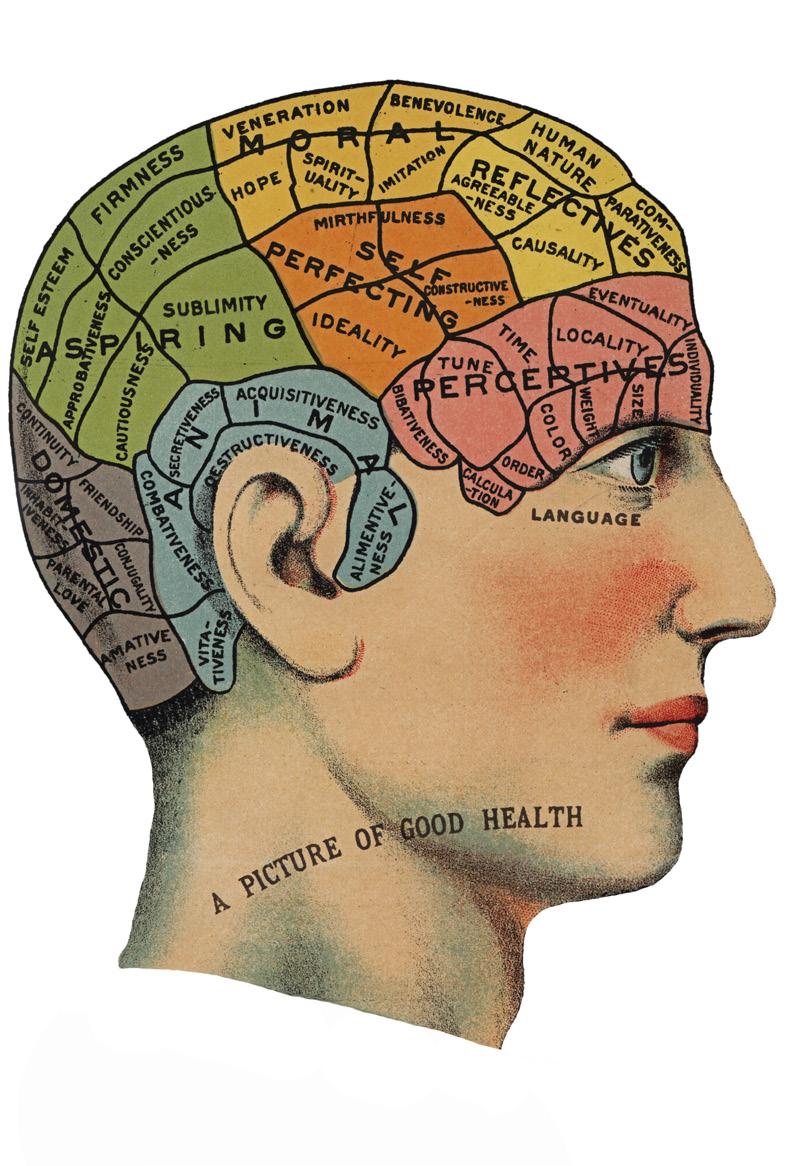
32
RELIGIOUS STUDIES
Examination Board: OCR Mrs L Rogers – Head of Religious Studies
Specification: H573 lrogers@kings-rochester.co.uk
Philosophy of Religion
Learners will study:
• Ancient philosophical influences
Arguments about the existence or non-existence of God
• Nature and impact of religious experience
• Challenge for religious belief of the problem of evil
• Nature of the soul, mind and body
• Possibility of life after death
Ideas about the nature of God
Issues in religious language
Religion and Ethics
Learners will study:
• Normative ethical theories
• Application of ethical theory to two contemporary issues of importance
• Ethical language and thought
• Debates surrounding the significant ideas of conscience and free will Influence on ethical thought of developments in religious beliefs and the philosophy of religion
Developments in Religious Thought
Learners will study:
Religious beliefs, values and teachings, their interconnections and how they vary historically and in the contemporary world
• Sources of religious wisdom and authority
• Practices which shape and express religious identity, and how these vary within a tradition
• Significant social and historical developments in theology and religious thought
• Key themes related to the relationship between religion and society
Each unit is worth 33.3% and is examined through a two hour examination for each topic.
Pupils are expected to develop reasoning skills, as well as read a great deal around the topics covered in class. This is a challenging, very enjoyable and rewarding subject that will help to open the mind to many new ideas and thoughts.

33
SOCIOLOGY
Examination Board: AQA
Mrs S Miles - Lead Teacher of Psychology Specification: 7192 smiles@kings-rochester.co.uk
Sociology is the systematic study of human society, it explores how individuals and groups interact, how structures of society develop and change over time. It considers the many complexities of human behaviour, culture and how we are shaped by the institutions in society. Sociology helps us understand the world we live in.
The AQA sociology course aims to give pupils a clear understanding of key influences in society and the impact these have on members of society.
The specification covers
Education – This topic considers the role of education in society, focusing on a range of issues including socialisation, inequalities, the impact of educational institutions on both individuals and groups within society.
Families and Households – This topic explores the concept and role of family and how family structures have developed and changed. It considers a range of topics including: marriage, divorce, childhood and parenting and the influence that the dynamics within households have on individuals and groups.
Beliefs – This topic examines beliefs and religion and the influence that faith has on both individuals and societies as well as the influence of socialisation and globalisation.
Crime and Deviance – This topic tackles the complex issue of crime and the deviant behaviour that leads to crime. It considers the causes and consequences of crime and the criminal justice system as a response to crime.
Research Methods – This topic teaches pupils the research skills needed to consider sociological and societal trends. It teaches them how to design, conduct and analyse research and to evaluate the research conducted by others.
Theory – This topic considers the foundation of key sociological approaches as well as more modern approaches. Theories considered include Functionalism, Marxism, Feminism and Postmodernism.
Key skills
Studying A Level sociology allows pupils to develop key skills in
Critical thinking – sociology teaches pupils to question social norms, analyse societal issues and gain a deeper understanding of the world around them.
Research and Analysis – pupils gain practical skills in gathering and analysing data.
Communication – pupils learn to effectively communicate their ideas and arguments in both written and verbal form.
Empathy and Cultural Awareness – the study of different cultures and societies encourages empathy and cultural sensitivity.
Structure of the Exam
Paper 1: Education with Theory and Methods
Paper 2: Topics in Sociology
Paper 3: Crime and Deviance with Theory and Methods
Each paper represents 33.3% of the final grade

34
SPANISH
Examination Board: AQA
Mrs N Wiltshire – Head of Spanish Specification: 7692 nwiltshire@kings-rochester.co.uk
The aim of the A Level Spanish course is to build on the knowledge, understanding and skills gained at GCSE and to develop students’ understanding and awareness of the diversity of Hispanic Cultures and people. It constitutes an integrated study with a focus on language, culture and society leading to acquisition of skills, knowledge of the language for practical use, further study and employment. The course fosters a range of transferable skills including communication, critical thinking, research skills and creativity, which are valuable to the individual and society.
The Spanish A Level specification has been designed to be studied over two years. The approach is a focus on how Spanish-speaking society has been shaped socially and culturally and how it continues to change.
In the first year, aspects of the social context are studied (Modern and Traditional Values, Equal Rights and the Cyberspace), together with aspects of the artistic life of Spanish-speaking countries (Spanish regional identities, Modern day idols and Cultural heritage).
In the second year further aspects of the social background are covered, this time focusing on matters associated with multiculturalism (Racism, Living together, The role of the Church). Pupils also study aspects of the political landscape including the future of political life in the Hispanic world by focusing on young people and their political engagement (Monarchies and Dictatorships, Unemployment and Social Activism).
Assessment
Paper 1: Listening, reading and translation
Paper 2: Written response* and Grammar application – * Essay questions based on set texts/films by prominent Hispanic artists , for example Gabriel García Márquez, Isabel Allende, Laura Esquivel, Guillermo del Toro, Pedro Almodóvar, Diego Luna, etc.
Paper 3: Spoken response in 2 parts – Part 1) Independent Research Project Part 2) Response to a stimulus on one of the 4 main course themes (Aspects of Hispanic society or Artistic culture in the Hispanic world or Multiculturalism in Hispanic society or Aspects of political life in Hispanic society).

35
Thoughts and Ideas
36
Satis House • Boley Hill • Rochester • Kent • ME1 1TE Telephone +44 (0)1634 888555 www.kings-rochester.co.uk









































